#There is lore significance here... Will i discuss it... No
Explore tagged Tumblr posts
Text
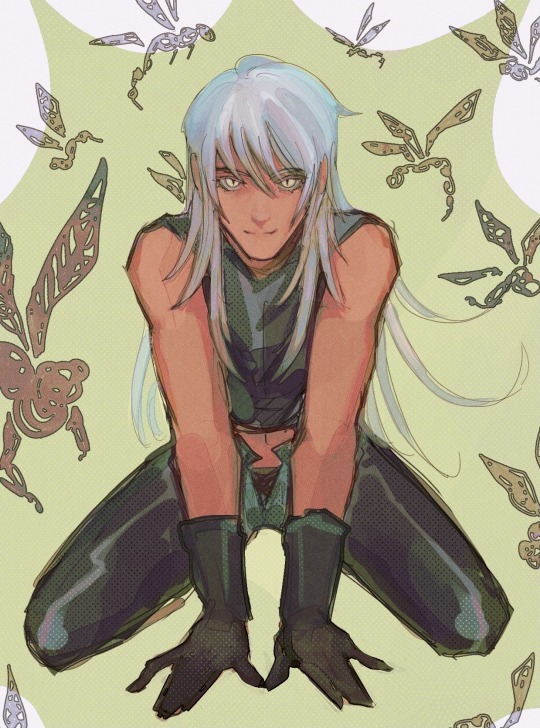
zazie
#trigun#zazie#zazie the beast#taps mic anyone here cares abt zazie. is it crickets.#i’ve been sooo interested in zazie and their lore/significance to the story since reading trimax#i feel like adding another variable to the conflict would have been rly interesting and that variable being the native species#on no mans land would have added more nuance to the story#and there was an attempt to discuss that but nothing rly came of it#cause of THE MENACE OF SOCIETY escaping his damn ward cell#i want more worm involvement#in a story so heavily focused on the survivability of one’s species and abuse of power i just think. looking more in depth at the hosts#of the planet would have been cool.#guy in chair rocking back and forth manically#and i love bugs also#cupidle
696 notes
·
View notes
Text
something i noticed


A while back, I wrote this analysis reviewing how unfair the magic education system is in Twisted Wonderland. I would recommend reading that before this post, as it provides tons of context for what I’m about to talk about and add onto the discussion.
In 2-6 of the Tapis Rouge event, Vil has stylists from Luxe, a high end fashion brand, dress up Azul, Jamil, and Ace to be a part of his red carpet entourage. Once the boys come out in their new threads and makeup, Jamil and Azul, two individuals who are meticulous about details, provide some telling commentary.
According to those two, the team of stylists that helped them were mages. Azul further remarks that they were quite skilled mages and that having this kind of talent indicates a “first class brand store”. Their hair and makeup is also suggested to be done via magic, though this service is not normally performed for customers. Previously, we knew that skincare can be infused with magic (Vil does so with his own) and that magic can be used to style one’s hair (Jamil tells us in his Birthday Boy vignettes that he does his intricate hair with magic and used to take far longer with it when he lacked the precision). Idia states in book 6 that Jamil had no formal magic training before NRC, so that means Jamil was self-taught in his hair-handling magic.
… Okay but 😭 WHAT DOES THIS IMPLY ABOUT MAGIC AND CLASS??? Is it just a coincidence that the teams of stylists who staff a high class store are ALL mages? Surely not, given how uncommon mages are in the general population. The store (or maybe the brand itself?) must be going out of its way to hire them because I guess being dressed with magic is a more “luxurious” experience than the normal way. We can also guess from Azul and Jamil’s accounts that the degree of magic these staffers use requires significant skill and precision, which either means they need formal instruction or lots of practice on their own. Neither option is afforded to people with naturally low or no magic reserves at all 💀 meaning jobs like this are gated to mages only.
Now, this doesn’t inherently mean the rich and famous people who frequent these stores are also all mages (Kalim’s dad and Vil’s dad are two non-mages who are extremely wealthy and influential); the majority of them must still be regular people since humans seem to be the majority, and 90% of humans are non-mages. It also doesn’t guarantee that the Luxe stylists are paid more than a non-Luxe stylist (although I do think this is possible for a prestige brand, especially if we factor in commissions on sales).
What’s sticking out to me here is that there exists an association between magic and luxury. The reverse also appears to have some truth based on what little other lore we have; Ruggie states that there are not a lot of mages from his hometown, which could imply a history of non-mages being driven into poorer communities. It all fits together a little too well to seem coincidental… but obviously, Ruggie’s hometown is just one place and could be an outlier rather than the exemplar. We know that most non-mages must live an average lifestyle, not the extremes that Ruggie has experienced. Still, the claim that magic is typically associated with the upper class holds and it continues to be perpetuated in the lore.
Anyway, Fellow and Rollo were right—
#twisted wonderland#twst#Vil Schoenheit#Ace Trappola#Jamil Viper#Idia Shroud#Azul Ashengrotto#disney twisted wonderland#disney twst#notes from the writing raven#tapis rouge in the shaftlands spoilers#Eric Venue#Ruggie Bucchi#twst analysis#twisted wonderland analysis#twst theory#twisted wonderland theory#twst theories#twisted wonderland theories#Fellow Honest#Rollo Flamme#AM I OVERTHINKING THIS…#Ernesto Foulworth#Gino
730 notes
·
View notes
Text
The Season 2 Opening. We Must Discuss.
First of all, small beans. Instead of static, lifeless statues, this time we get moving humans. Mel features significantly more than I expected, so she'll probably be a much more major character than I expected for a non-champion character and I'm so happy for her. I believe the use of moving people instead of statues signifies that immense change will be happening. What we thought was literally set in stone in Season 1 will be turned on its head in Season 2.
Okay, on to the really concerning matters.



Yuhuh. Jinx moves too fast for me to get a good screenshot, but she gestures like this around her face a lot. I think we all already know about the Caitlyn-Jinx parallels, but my sister suggests it could be a red herring for the actual resemblances she has to Silco.
Sis gets credit for the following observation, but Caitlyn's daydream sequences about shooting Jinx are controlled and clearly separated from reality unlike Jinx's.
However, sis has not seen ep 2 yet, where Caitlyn does have that moment in the arcade where she shoots her vision of Jinx among the wooden dummies. Not only does this more closely resemble Jinx's hallucinations, it also parallels Jinx shooting the harmless crow in s1 e5. By the time the strike squad are about to leave, she can clearly tell that what she thought might be Jinx was really just a harmless wooden standee. Startling, but harmless. She shoots it anyway.
Caitlyn is totally gonna spiral more, and maybe she'll start losing her grip on reality too, but for now, she has more in common with Silco than she does with Jinx. Did anyone else get reminded of Silco's coat when Ambessa put the supervillain cape on Caitlyn? The collars don't look similar but they still eerily resemble each other, you get me?




Ok back to intro stuff

Vi wipes off her name from her face. That's two tattoos that are rendered impermanent in this opening theme. In the Fenty x Arcane video, they mention that Mel's golden freckles are tattoos. Later in the intro song, we also see her golden freckles gone. Change, impermanence. That seems to be a theme here.
Vi is literally erasing her name from her face. In any normal circumstance, I'd say that means she wants a change of identity, a desire to start over. However, I know that Vi's League lore involves amnesia. Does she really drink herself into that bad of a stupor? Jkjk. I assumed that her amnesia was replaced by the Stillwater imprisonment to explain how she got topside and with the enforcers, but perhaps I was wrong. Maybe they do still intend to go the amnesia or partial amnesia route with her.
The teasers implied that Vi shares the genetic trait that has Jinx predisposed to hallucinations. It's possible that this eventually contributes to her loss of memory, but I wouldn't call it quite yet. However, if this happens during her emo era when I'm assuming she has no support system, she'll be very vulnerable, unlike if it were to happen while she was still partnered with Caitlyn, in which case they could easily fill in most blanks in her memory.


I have no idea what to make of this. It's clear as day what they're paralleling, but why? Why the flashlight scene? My best guess is that they're trying to draw on déjà vu, implying a repetition of history, but why this particular moment? They could've easily chosen anything else in Jayce's s1 arc. He has many more memorable moments than this. Let's see, I'm literally making this up as I go.
This meeting was a pivotal moment for Jayce. Both his meeting with Viktor and his meeting with Mel changed his fate. The Viktor one is pretty self-explanatory, but without meeting Mel, they would've both just gotten exiled or locked up again. With Mel, they had someone in power who could vouch for them.
That begs the question, is Jayce meeting someone new? Or is this a reintroduction to someone he's already known before, a new meeting after a long time apart or after a significant change, maybe a change in them both. I believe it must be someone who was involved in the original hallway scene.
Jayce is either looking at Mel again or at Viktor. Given the amount of Viktor/Mel parallels in Season 1, I believe Jayce is looking at Viktor after he's undergone his likely final evolution. That'll obviously be another pivotal moment for him... but will it be a good one like it was with Mel? Viktor has power now. He's performing miracles. He's, like, two steps away from parting the Pilt River like it's the Red Sea. He seems to hold a grudge against Jayce, though, for *checks notes* saving his life? Jk I know he feels like he's losing autonomy and like Jayce didn't respect his wishes with the Hexcore and Jayce obviously couldn't let Viktor die when he'd fought so hard to stay alive before.
Anyway, I feel like this could easily be both a good omen and a bad omen for Jayce. More than anything, I feel like it'll be an epiphany. He is quite literally seeing the light. The light at the end of the dark tunnel? The light of the heavens at the end of his life? The light of a revelation sent by a god he once knew as a man?



Seeing Mel screaming bloody murder during the opening, this was the first place my mind went to. The pose doesn't match up exactly, and Jinx/Powder's screams are definitely wilder, but I feel like there's definitely something here. Is there anyone else who screams like this, thrusting their head forward and keeping their arms back?
We also see the shadow hands from this earlier shot:

I'm thinking of the Black Rose (is that their name?) kidnapping her in thin air, incorporeal hands reaching at her and snatching my joy the love of my life Mel away. It could also represent people grasping at the power Mel wields, both as the wealthiest Council member and as a Noxian princess, one of the closest people to Ambessa, the one wielding the most power right now.
Mel is really out of her depth right now. Her power and influence is up for grabs if she dares to blink and let her guard down. I'm also surprised that we don't see her fight back at all when there's danger around. I thought she might have more battle experience as she was raised by Ambessa. For those people wondering about her magical powers, I think she would've used them by now if she had them. Council attack aside, which could've been Viktor's magic, she wasn't able to do anything about the memorial attack or her own kidnapping. I think they're trying to show us that Mel is not as untouchable as she presents herself. Under the right circumstances, she's just as vulnerable as any civilian.
The sliver of light? My sister pointed out that it looks just like the crack of light between two double doors. Almost closed... or barely open? It appears in pretty much everyone's shot in the opening, but it's right down the center of Mel's face here. Is she torn between two sides? Is this about an impossible choice she has to make?
The spotlight is also on her. That's two sources of light. It looks like a red sun. All eyes on her as the surviving voice of the Council?
And her expression... shock, fear, horror. The heavy breathing, the look on her face... I feel eerily like I've seen it on someone else before. I can't place who, but I'm getting déjà vu from this. Does anyone else recognize this expression and these mannerisms?
#anyway that's all I have#this was about ten times longer than I planned for it to be#arcane#arcane theory#arcane speculation#arcane spoilers#arcane season 2#caitlyn kiramman#jinx#jinx arcane#powder#powder arcane#vi#vi arcane#silco#ambessa medarda#jayce talis#viktor#viktor arcane#mel medarda#arcane opening#citrus post
244 notes
·
View notes
Text
Gale's Netherese Orb
The Condition and Symptoms
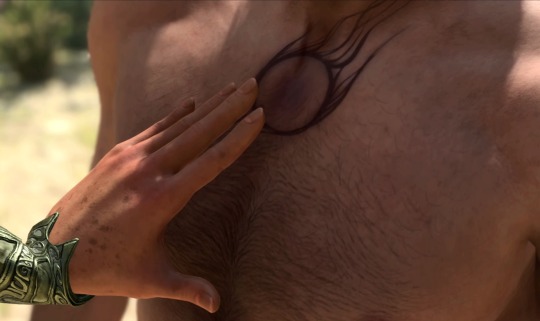
You asked for it! You're getting it! Yet another deep dive, this time about Gale's orb functioning as a chronic impairment/disability and the ways that a cure is dangled in front of him and even withheld from him.
Disclaimer: a lot of this has already been discussed by lore-wizards like galedekarios or mezzziah and some information is going to come from actual-lea's wild playthrough of the Gale Origin where they didn't give him any magic items just to see what would happen (which I recreated quickly in my own game to gather screenshots and gifs of my own). I'm not going to tag any of them because I don't want to bother them, but if you want even more lore, you can and should check them out!
We're going to look at Gale's orb "condition" in three phases: the effects of the orb on Gale's body itself, the ways that he has to treat it, and the potential cure for the orb. Because my deep dives always get a little out of hand, I’m splitting this into 3 posts. So you can take and leave whatever you like, but I'll link the masterlist to all 3 parts here once I have them posted!
But without further ado, let's deep dive!
I've said before that Baldur's Gate 3 is ultimately a game about cure—finding a cure for ceremorphosis, specifically. Every companion is facing a (potentially lethal) forced transformation into a squid creature in seven days or less unless they find a cure. At least, that's what they think before they realize that their tadpoles are special. On top of that, several characters, including Gale, especially Gale, are also dealing with additional chronic conditions that they wish to cure.
Let's set aside the search for the tadpole cure for a minute and focus on Gale—his character arc, his goals, even the text for his questline. The moment that Gale steps out of his pod on the nautiloid, he has a twofold goal: find a way to cure or treat the hungering orb in his chest and find a way to cure or stop ceremorphosis, in part because turning into a mind flayer may destabilize the orb, thus making the orb the bigger or more significant problem for Gale personally.
In other words, on two fronts, Gale's entire plot is concerned about curing a chronic, potentially lethal condition (or two), but the orb is the bigger issue between the two. Turning into a mind flayer is one thing, turning into a cataclysmic explosion that could "level a city the size of Waterdeep" is another.
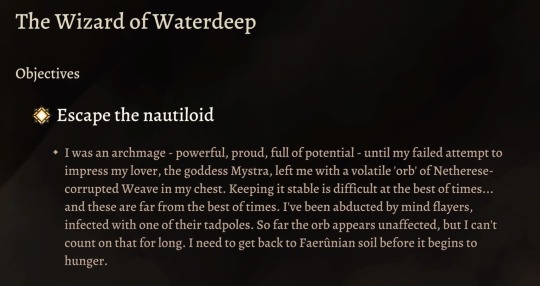
The Wizard of Waterdeep Objectives - Escape the nautiloid I was an archmage - powerful, proud, full of potential - until my failed attempt to impress my lover, the goddess Mystra, left me with a volatile 'orb' of Netherese-corrupted Weave in my chest. Keeping it stable is difficult at the best of times...and these are far from the best of times. I've been abducted by mind flayers, infected with one of their tadpoles. So far the orb appears unaffected, but I can't count on that for long. I need to get back to Faerûnian soil before it begins to hunger.
Despite being infected by illithid tadpoles, Gale's larger concern is that staying in the hells will make feeding the orb difficult. When he gets off the nautiloid, he's worried that turning into a mind flayer will completely destabilize the orb. It's his primary concern and will continue to be so throughout the game.

Narrator: Despite your recent fall from the nautiloid, you are miraculously unharmed. Apart from the volatile orb of Netherese magic buried within your chest, of course. It stirs softly. Soon it will hunger, and when that time comes it must be fed. Starve it, and you risk triggering a cataclysmic explosion of raw, unfettered Weave. Such an explosion will be unavoidable, if the tadpole in your skull triggers ceremorphosis. An outcome definitely best avoided.
So, yeah, the squid thing is a problem, but Gale is definitely more concerned about exploding. But exploding and "hungering" aren’t the only things the orb does to his body.
I’m going to break down the actual condition into three smaller segments: the words Gale uses to talk about his condition, the physical effects that Gale describes happening to him, and the mechanical gameplay effects. I’ll talk more about the actual “hunger” of the orb in part 2 when I talk about its treatment, in part because the hunger and the treatment are both magical effects and are intrinsically linked. But for now, let's start with a look at how Gale talks about the orb.
Call it a Condition
To start off, Gale describes having the orb in his chest along the same lines that people might discuss chronic impairments or chronic illness. It's not a minor "issue" or a "problem" that is disconnected from Gale's body and physical/mental health; instead, he calls it a "condition," a "malady," and even a "chronic impairment." He couches the condition in terms that evoke illness and unwellness.

Gale: You see, I have this...condition. Very different from the parasites we share, but just as deadly. Player: What kind of condition? Gale: The specifics are rather personal, but suffice it to say that it is a malady I have learned to live with - though not without some effort. Player: (Durge) You also feel disgust by how life, miserable as it is, insists of persisting in this most wretched world? / (Tav) Is it contagious? Gale: No, no - nothing like that. Though if I fail to treat it then the consequences would not be contained to me alone. Player: Can it be cured? Gale: No, it cannot be cured. And I assure you I've left no page unturned in reaching that conclusion. I can keep this condition under control, as indeed I've done for a significant amount of time, but that was under different circumstances altogether. Home, in Waterdeep. What it comes down to is this: every so often I need to get my hands on a powerful magical item and absorb the Weave inside.

Player (Ranger): I think I might have a dock leaf in my bag, or some medicinal berries... Gale: Thank you for the offer, but the treatment for my condition is very specific.

Gale: The reality of the matter is that a lone wizard with a chronic impairment such as my own is not in the most ideal of situations with regards to self-defence.
In Gale's first conversation with the player about the orb, which is where all of the above comes from, he uses language related to illness and chronic pain/impairment to discuss the orb. It's a "condition," it is a "malady" that requires "treatment," it is a "chronic impairment," and so on.
Generally, at first, he speaks lightly about it and even continues to joke about his condition ("my tower in Waterdeep has never been so free of clutter" and so on), but the reality is he's underplaying the actual physical toll it takes on his body. When you ask him what happens if he doesn't consume any artifacts, he'll briefly describe some symptoms to you that aren't obvious to the player character. Which brings us to...
The Physical Symptoms
This is how he describes the initial physical symptoms of the orb's hunger:
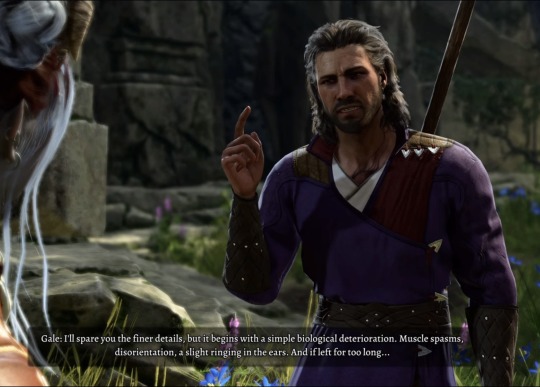
Gale: I'll spare you the finer details, but it begins with a simple biological deterioration. Muscle spasms, disorientation, a slight ringing in the ears. And if left for too long...catastrophe.
In other places, we see the orb's hunger/pain also affecting his ability to think clearly, suggesting he's experiencing a kind of brain fog or concentration issue, plus general discomfort, and a feeling like something is gnawing at his insides, as seen in various lines below.




Gale: You'll have to speak slowly. I'm finding it quite difficult to concentrate with my condition gnawing at my insides like a teething displacer kitten. Gale: Somehow the second artefact hasn't had the effect of the first. It's somewhat relieved the discomfort, but I fear my hunger hasn't quite... Ahh...* Gale: But... this doesn't feel quite right... It never feels right, but it relieves. This doesn't relieve... Ahh...* *devnote: Near the end of the line he's in discomfort, in pain
This is all from the second artifact conversation, when you give him the second item to try and feed the orb's hunger (the last line is a lower approval/you've-been-begrudging-about-items kind of line, so he's still being closed off with you). When you hear these lines in the game, he's obviously speaking with discomfort and with difficulty, as if trying to string words together despite the pain. His little comments as you travel with him/as him while he is dealing with arcane hunger also reference weakness, pain, and concentration issues.

- I'm feeling rather unsteady... - Deep breaths, Gale. Hold it together. - I'd be rather enjoying this journey, were I not wracked with pain. - One step in front of the other, Gale. - Ugh, I feel rotten. devnote: Slightly pained/struggling with a constant ache (the orb is negatively affecting him, causing him pain. Prompt is to remind the player that Gale is unwell.) [mumm's note: there are other lines as well, beyond these, and Gale will say them at random, so there's no progression into better or worse. This is just a sample of the lines.]
Given everything so far, I suspect the pain he feels is a combination of heart/chest pain, like one might feel during an anxiety attack, a POTS flare-up, or even a heart attack, while the gnawing sensation could be like hunger cramps (or any other internal cramping, though I think for Gale it feels higher up in his body than in his stomach, given the orb's location).
I highly suspect the orb is feeding off of not only his magic, but his body as well. We know it feeds off his magic specifically (more on this in the other two parts, especially because this detail doesn't come to light until Gale meets with Mystra). But given the pains and the way he frames his condition as a state of deterioration, it's likely that it's also feeding off energy stores and other biological/physical elements of his body, not unlike how extreme hunger can cause your body to essentially eat itself—your fat stores first, but eventually even your muscle tissues and other vital tissues.
(I've seen someone suggest this is why Gale has "dehydration state" chiseled abs like movie stars have because the orb is literally eating away at his fat/energy stores and so on. It's a compelling theory!)
The orb also weakens him, likely causes massive fatigue, and even seems to be draining his "spirit" or his mental capabilities. We see this in descriptions of Arcane Hunger (which are below). It's a wonder this man can put one foot in front of the other if the pain is particularly bad.
In addition to all the other physical symptoms, the orb itself has physically scarred his body with the marking on his chest, which is also bruising pretty significantly (though this "bruising" could just as likely be dark-colored magic just beneath his skin, your headcanon/mileage may vary).
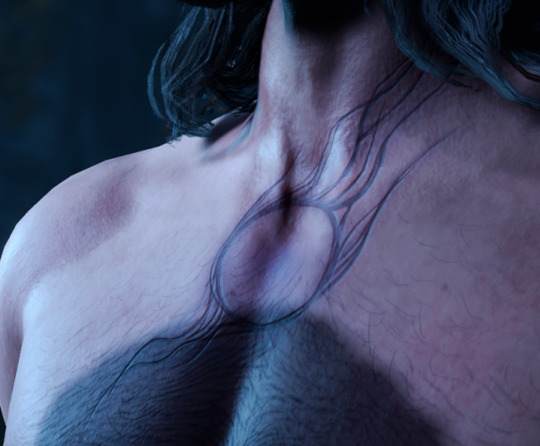
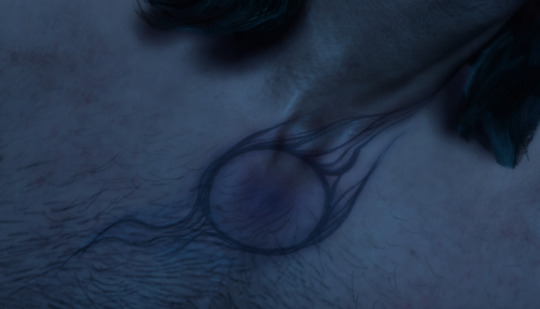
Photo credits: @elspethdekarios, though I cropped them down for this deep dive
If you click on the images and zoom in, you can see how the markings have a bit of depth and texture to them, as opposed to the flat lines of a tattoo. The lines are carved into his skin. Certain lighting will also make the mark look darker or lighter, and make the bruising at the center faint or noticeably dark. There are some theories that the bruising gets worse as the game goes on, but I think it's just a lightning issue (though it would be interesting if the bruising gets darker with each new level of arcane hunger, or something to that effect).
Lastly, and I'll discuss this more in part 2, even when the orb does not actively pain Gale, it "stirs." Other references from the narrator reveal that the orb "shudders" or "prickles" within him. Gale can feel the movement of the orb inside his body, possibly like a weird fluttering or vibration in his chest. It's likely why, even when he isn't actively hungering, he'll put his hand over his chest and adjust his shoulders, as if reacting to a strange and slightly uncomfortable sensation within his chest.
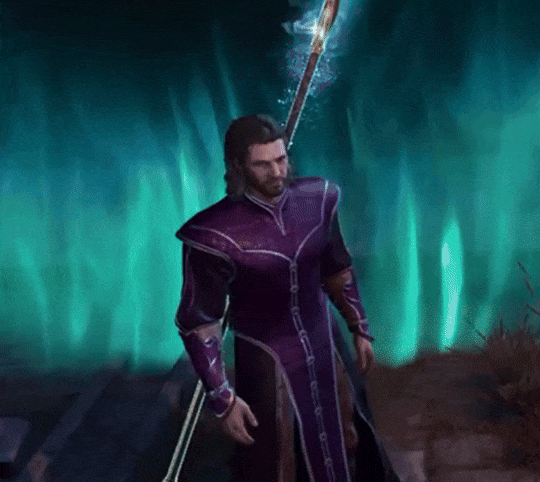
Anyway, long story short, the physical symptoms of dealing with the hungering orb are:
Biological deterioration (like hunger, the body consuming itself, muscles weakening, etc)
Muscle spasms
Disorientation
Ringing in the ears
Difficulty concentrating/brain fog/mental fatigue
Cramping and/or chest pain
General discomfort and pain
Physical fatigue/feelings of weakness
Scarring and bruising from the orb itself
A sensation of the orb "stirring" even when not painful
And this man will joke about it.
Honestly, his ability to joke and discuss his condition with humor is a sign to me that he really is experiencing and thinking of the orb the same way people with chronic conditions think about their pain or illnesses. At the start of the game, Gale's condition is incurable—Gale says as much himself that it "cannot be cured." It can only be managed, treating the symptoms and diminishing the pain, rather than completely eradicating the impairment. Gale likely has a new scale for pain, the same way people with chronic pain do. A "bad day" for him would likely end most healthy, normative people in a clinic hoping for some prescription pain medication, whereas he will just grit his teeth and keep going. In short, saying that the orb is a "chronic impairment" is a bit of an understatement, and I don't think people realize just how much Gale is/acts like a person dealing with real-world chronic pain or chronic illnesses.
Gale is used to this pain, though he certainly isn't enjoying it. Have you ever persuaded him to wait before giving him a magic item? If your persuasion is high enough (and he likes you), he'll give a cheery "of course!" even though treating the pain is obviously the preferable path here. When he reminds you of his need for an item, as with the "teething displacer kitten" line or the "My condition likes being ignored as much as I do," he still conveys these lines with a mix of urgency and dark humor. He's dealt with this condition for a year or more. You might be testing his tolerance by withholding items, but he's not going to let on just how badly he's actually feeling.
This is the man who will uncomfortably laugh and say "Gods, this is bloody uncomfortable," while the orb in his chest is running a high-grade POTS flare-up and consuming his innards. That's what we call an understatement, Gale. He could complain a lot more, and far more loudly, but he's actually keeping it quite restrained, as people with chronic pain often tend to do.
So anyway, if you ever hear anyone complaining that Gale complains about his magic orb condition too much, ask them how much they'd like walking around with heart-attack symptoms for a few hours at a time. But let's move on!
The Gameplay Effects
Now that we know what the orb does to Gale narratively, what does his condition do to him mechanically in the game? Because, unlike with Karlach's unstable engine or Shadowheart's incurable wound (other examples of chronic pain/disability in the game), the game adds actual debuffs to Gale's character that can affect gameplay and battles. Therefore, leaving Gale disabled with pain also, in effect, disables the player's ability to play the game (or at least hampers it).
In the game, there are three stages of Arcane Hunger. Most people generally don't go beyond the first stage, because why would you let Gale walk around with a debuff of any kind if you have a locket of dancing lights you'll never use? But if you continue to ignore him (or, if you're playing as Gale, and willfully choose not to consume any items) then the Arcane Hunger will progress to Greater and Severe Arcane Hunger, bringing even more serious debuffs to his character.
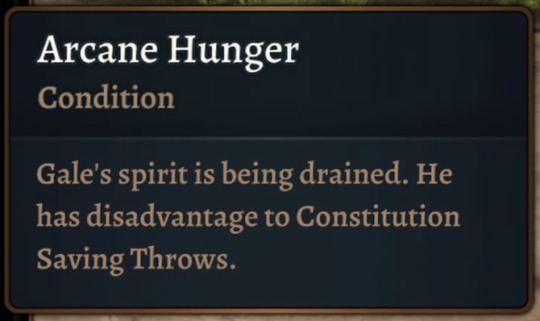
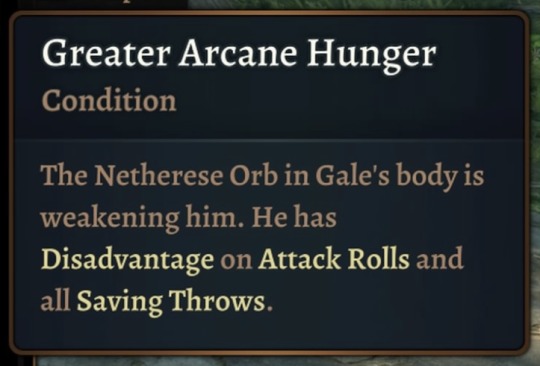
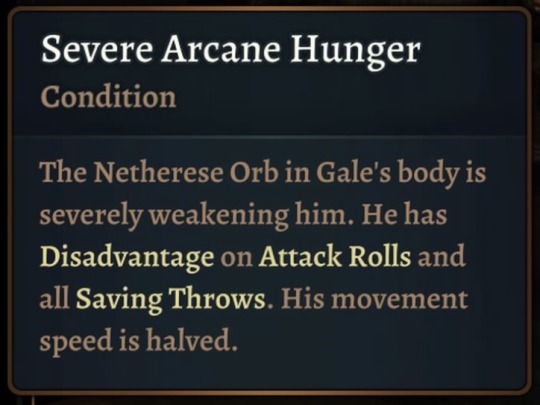
Arcane Hunger - Condition Gale's spirit is being drained. He has disadvantage on Constitution Saving Throws. Greater Arcane Hunger - Condition The Netherese Orb in Gale's body is weakening him. He has Disadvantage on Attack Rolls and all Saving Throws. Severe Arcane Hunger - Condition The Netherese Orb in Gale's body is severely weakening him. He has Disadvantage on Attack Rolls and all Saving Throws. His movement speed is halved.
Casual reminder that Constitution Saving Throws generally affect concentration, which is needed to maintain spells that last for more than one turn. This goes back to Gale's concentration/mental fatigue when he's initially hungering. When the hunger progresses, however, Gale is physically weakened and the game makes it so that he's more likely to fail savings throws or attacks.
Trying to normally play as Gale with these debuffs is basically an exercise in resigning yourself to missing attacks frequently and failing literally every saving throw (this includes disadvantage on saving throws in dialogues as well). He's still playable, since Magic Missile never misses and you can work with spells that deal damage even when an enemy passes their saving throw, but he becomes even more of a glass cannon than ever. If he's not at the back of a fight, he goes down pretty quick.
Once you hit Severe Arcane Hunger (which I hit after only 6.5 hours of rushed gameplay, though you could probably hit it sooner if you were zooming through a bit faster than me) you're also forced to walk everywhere. Gale's movement speed is halved. The distance he can move in a single turn is drastically shorter than usual, and his speed is no faster than a casual walk. Anyone who has tried to move while encumbered knows this same walking speed debuff.
So the game literally takes Gale's chronic impairment and makes it disabling to both him AND you controlling him. No one really wants to play the entirety of BG3 at a walking pace, after all, so it forces you to make a decision—will you finally treat Gale's condition, or will you grit your teeth and bare it, like Gale does with his pain (though it's nowhere near close to the same levels of discomfort).
Typically a companion Gale will just leave if you refuse to give him any items and he progresses to the stage where he's at Severe Arcane Hunger. But if you play as Origin Gale, you can keep playing with Severe Arcane Hunger until, well, his condition literally paralyzes him and then he withers away, apparently dying of necrotic damage from the orb (I’m assuming here, because the log doesn’t specify what damage causes Gale to wither away, and he exudes a necrotic damage aura once he’s dead, which happens whenever he dies anyway).
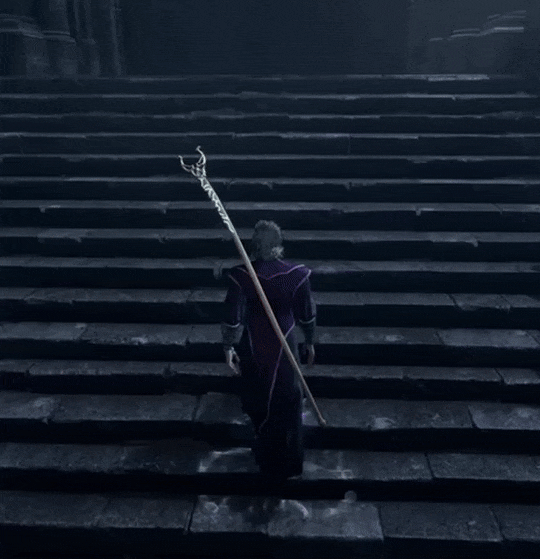


Gale withered away. Gale lost Condition: Gale is Paralysed. Gale received Condition: Gale is Paralysed. [mumm's note: obviously this is listed in reverse order, because Gale becomes paralyzed and then withers away]
It appears that if left untreated, Gale’s biological deterioration reaches a point that it literally shuts his body down completely, and then he just...dies. I imagine that physically the orb has eaten away at so many of his vital tissues, including his internal organs, that everything just sort of ceases to function. He's corrupted from the inside out, and nothing but death and a quick resurrection can reverse those effects.
It's worth noting that if you choose to do this experiment with Origin Gale and don't feed him a single magic item, then Elminster won't be waiting for you to arrive in the Mountain Pass or just outside the Shadow Cursed Lands if you travel through the Underdark. Since Gale hasn't been managing his symptoms, he hasn't realized that the various items he's consuming aren't having any effect. Therefore, he isn't actively looking for a new solution to treat the symptoms. Since he isn't looking, I guess Elminster never thought to make himself available with the new solution?
Honestly, why Elminster doesn't show up is kind of a mystery. Gameplay-wise, I assume it's that Gale's quest didn't progress enough to trigger the game flag that would spawn Elminster. But lore-wise or narratively, it doesn't make sense. Mystra sends Elminster with both a command and a temporary "cure," so is she just waiting until Gale realizes his symptoms can no longer be managed? No idea. Maybe I'll explore it more in Part 3.
Anyway the point is that when an untreated Gale reaches Moonrise without talking to Elminster, the game (and his condition) shuts him down. When you revive him at camp, Elminster conveniently appears to give him Mystra's command to sacrifice himself at the Heart of the Absolute and stabilizes the orb at last.
But there's a catch.


Elminster Aumar: A shame that we did not cross paths sooner. The orb's thirst for magic is now quenched, yet it already inflicted some damage while you tried to forge ahead. The ill effects may linger, I'm afraid. Not enough to hamper your mission, I hope.
I believe this can also happen with a companion Gale, but I'm not sure about the specific parameters of triggering this. Regardless, as actual-lea has observed in their No Gale Dinner experiment, if Gale has regular Arcane Hunger then Elminster stabilizes the orb and all is well, but if he has Greater or Severe Arcane Hunger, then the damage the orb does to his body becomes irreversible. After Elminster stabilizes the orb, in this scenario, Gale is left with a permanent "Arcane Hunger" debuff, the same as the above, where he suffers disadvantage on constitution saving throws. This time, you can't consume items to make it go away, and nothing will cure the debuff. Gale just permanently has it for the rest of the game.
(It's worth noting that you can also kill Elminster while he's talking with Gale, thus preventing him from stabilizing the orb with his magic and from telling Gale he needs to sacrifice himself. This sort of breaks the narrative for Gale and results in some wonky dialogue chains that do and don't flag correctly, but the interesting outcome is that it means you can continue playing the game with Severe Arcane Hunger, which is now also a permanent debuff. You can consume magical items before the Elminster visit, but never after. Even if you kill him, you lose the ability to consume items, which means it is officially impossible to manage Gale's symptoms. You just have to deal with the halved walking speed and disadvantage on everything. And you can complete the game that way, if you have the patience! But it would be a very long game. I would know. I've done it and I was rushing like a maniac lol)
Anyway this is getting super long, so I'll end with a few wrap-up thoughts.
Final Thoughts
Having played as Gale with Severe Arcane Hunger for several hours in the game, I think Gale honestly downplays just how bad the pain and debilitating effects of his condition really are. As I was going through the evidence, I kept thinking about how there are so many different elements of pain, discomfort, fatigue, and general unpleasantness that are all part of Gale's everyday life. Even when the orb is stabilized or not actively hurting him, he likely still feels it moving in his chest and I imagine there are chronic effects that stabilizing the orb couldn't exactly cure, like lingering fatigue (and we wonder why Gale complains about his knees and wanting to take a rest and so forth).
Ookay the knees thing might be unrelated to the orb but I digress
Dealing with that much pain and internal corruption is a state of living that most people wouldn't want to stay in, and Gale is no exception here. He wants to stop the pain in his chest, just as much as he wants his former abilities and magical prowess to return. These things are connected, which I'll talk about in part 2. But without hope of a cure, Gale is forced to deal with his condition as a process of managing symptoms, creating a treatment plan that involves him consuming magic from magical items just to get a bit of relief.
But that, my friends, is where we'll pick up with Part 2 - The Hunger and the Treatment.
#screw it we post#hooooo boy this got LONG#I'm sorry and you're welcome in advance#bg3#baldur's gate 3#bg3 lore#bg3 meta#bg3 deep dive#deep dive#long post#gale#gale dekarios#gale of waterdeep#bg3 discourse#bg3 screenshots
371 notes
·
View notes
Text
( elden ring dlc spoilers )
(sort of personal rambling post about my feelings about it, not looking for lore discussions)
its so obvious to me that base game radahn and dlc radahn are two entirely different entities really
one is a nigh mindless mess of what remains of a respected and once, and still in a way, very powerful general, like a tragic memory of what once was, even in this zombie like condition you can get an idea of who he was, even if only a little bit, the way he fights in synch with leonard for example
the other a recreation of him but like it was made by someone who didnt know him at all, shallow and surface level, either unintentionally so bc he really didnt know him well (and didnt care to get to know him) or intentionally made into somethign that fit miquellas IDEA of him, who he wanted but not who he really was, it shares name and design traits, to some degree fighting style, but it lacks "him", he has no voice, no shift in expression, he does whatever miquella wants, a perfectly obedient, silent, animated statue (even more obvious in second phase ...)
i mentioned it in a previous post but even his changed designed feels strangely off, basic elements are there (red hair, yellow eyes, golden lion theme) but it lacks cohesion (imo), like an action figure not a real person, its shiny and cool looking but doesnt make sense for him, he even has the sixpack armor thing, and overall a roman aesthetic to him, mulitple braids in his hair (a trait of miquella), useless swords hang around his waist, arms exposed, overall incredibly thin compared to base game radahn (be it just the armor or not), like designed by someone who has no or little idea of how swordfight works, almost .. childishly cliché
and yes, the fact that leonard is entirely missing is significant in my eyes, he is very important to radahn, its one of the few things we actually know about the real radahn, but miquella probably either didnt know or doesnt care, he doesnt care about leonard, of course he isnt here
"promised consort", promised by who to whom? if miquella, perfect little miquella, says it is promised to him, it has to be true and good and no one would would dare suggest hed lie (i dont think radahn would like that title either, ...like even his title in the end isnt about who he really is)
its all about what miquella wants, his perspective is told to you over and over- what radahn wants, his perspective, what he believes in doesnt matter, radahn doesnt matter, the only thing that matters is how he can serve miquella, how this idealized, silent puppet that is nothing of himself apart from basic design traits and name obeys miquella
by rot or by miquella, just a mindless toy whenever you see him
and it just makes me sad and angry ......... its tragic but so much so that it borders on cruelty for crueltys sake, it was never about radahn :(
#ganondoodles talks#elden ring#elden ring DLC#elden ring spoilers#elden ring dlc spoilers#radahn#starscourge radahn#general radahn#im not gonna call radahn consort to anyone#(but to myself maybe hehehehslnhjnajdbnkjsbjk)#anyway#i do like tragic figures- its in part of why i loved him already from the base game#but this is shifting it to .... less tragic and more cruel than anythign else#i want to chew through concrete bc i love him so much and he deserves so much better#let him be himself for once aaaaaaaaaaaaaaaaaaaaaaaargh#AND THIS IS ALL WE EVER GONNA GET#AAAAAAAAAAAAAAAAAAAAAAAAAAAAAAAAAAAAAAAAAAAAAAAAAAARHJRBGHJBGFRDGJBDGJD#*cries*#i want to know him so badly#like real radahn#how he would fight in his prime as himself#dlc radahn is barely him#BC ITS NOT HIM#*cries again*
146 notes
·
View notes
Text
ss/mayo blogspot lore + frerard theory
hi I'm about to drop some insane lore that I don't think a lot of mcr fans/frerard theorists know about. this isn't discussed often so I figured I should write about it here before all the evidence is lost to time.
this is probably gonna be a long one so buckle in! i have gathered as much evidence here as possible but there's no way to be certain about anything. i'm trying to maintain as much journalistic integrity as i can throughout this post (also trying super hard not to insert my opinion too much) because i think a lot of this speaks for itself.
so i have a pretty significant frerard theory but i have to give a lot of backstory and documentation for it to fully make sense. this will not be in chronological order (to best suit the narrative) but i hope it makes sense
many people know about frank's F.T. Willz endeavors which have been proven as him in recent years. however, "ss" or "shitsubou shita" was another blog he had before this which is not widely known
around 2007, there was a major theory in the fandom that gerard and frank were running secret blogspot accounts where they'd post journals, poetry, etc. frank's account was iamthemodernprometheus.blogspot.com and gerard's supposed account was its-mayonaise.blogspot.com. both accounts are still up, though i'm not sure if any posts have since been deleted. this probably sounds crazy so i'll explain everything!
evidence for frank as SS/shitsubou-shita/iamthemodernprometheus
i strongly believe this was frank's personal blog, but you can come to your own conclusions based on this info
frank's supposed original blogspot handle was "shitsubou-shita." once fans realized this was his account, he deleted it pretty much immediately. you can read some fan discussion about the fall out from this in a comment thread here. this comment thread will be linked a few times in this post because most of the screenshots on this post originate from there.

apparently *frank* was posting some very personal thoughts/feelings on this blog that he did not want to be discovered. i'll go over some of the deleted posts in a minute, but first i need to give more a little more context.
at the same time the blog is found, someone comments "your fired" on a recent post. apparently some fans thought the comment looked strangely out of place, and it was one of the last comments left before the account's deletion, on one of the final posts made.
this will be relevant later on, and we'll get into the account's posts soon.
my theory is that someone on the "inside" could have found his personal blog and tried spooking him, which could have been the final straw for him. or, the account being deleted could be completely unrelated to the weird comment. all of this can be found here (same link i posted previously)

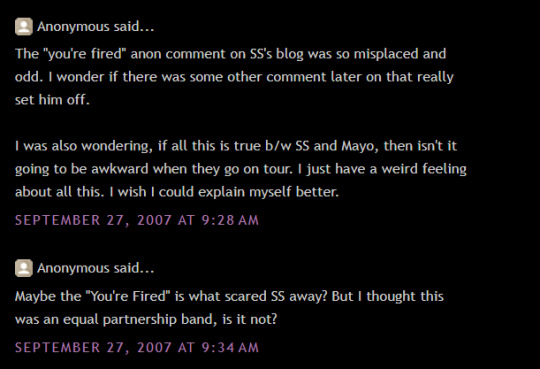
months after deleting their blog, shitsubou shita begins posting under a new url "iamthemodernprometheus" (but still under the pen name "shitsubou shita" or "ss" as fans called him)
in his new blog, and similarly to F.T. Willz years later, he still leaves plenty of crumbs for fans to figure out it's him. screenshot sources are below
latin heading: his page had a latin heading that when translated, reads "keep the faith"
bio on blogspot: "industry - chemicals", and "you dont stop playing cos you get old…you get old cos you stop playing" both sound suspiciously personal to frank
his url choice: "the modern prometheus" is the full title of mary shelley's frankenstein. frankenstein is a character that frank has always deeply resonated with due to his namesake, love of horror, and being born on halloween
spelling of wierd: SS and frank both spell "weird" as "wierd"
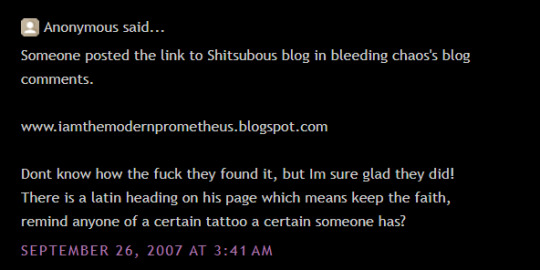
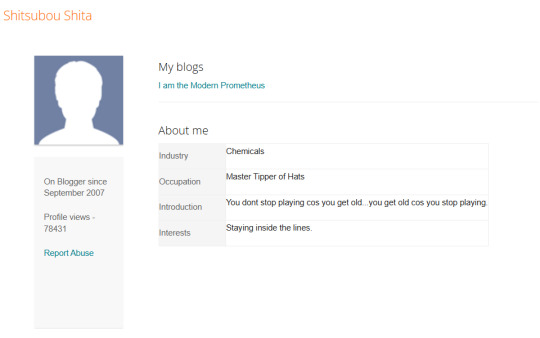



i think he enjoyed the mystery of having a secret online persona, which eventually led to the creation of F.T. Willz in 2008. it seems like wanted to leave just enough evidence for people to suspect it was him, but not enough to prove it.
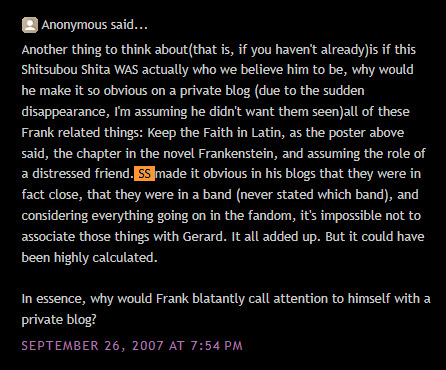
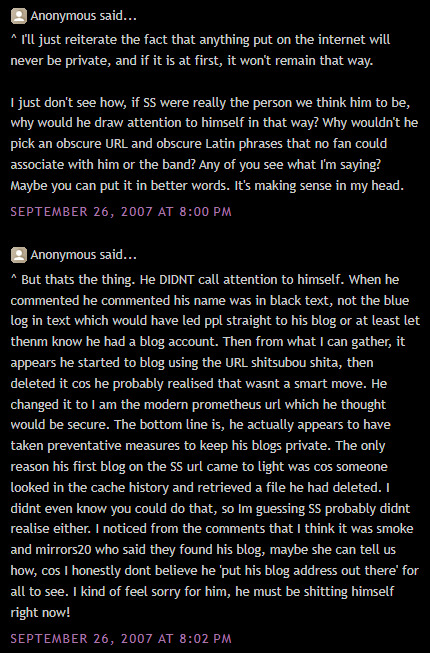
here are some snippets of 2007 era discourse about the identity of "ss" and their deleted blog. you can find all of these comments and more context here. this was around the time gerard got married and fans felt like the dynamic on stage was different, and they were concerned about the future of the band. it's a LOT to go over so i would advise reading the comments if you want more perspective
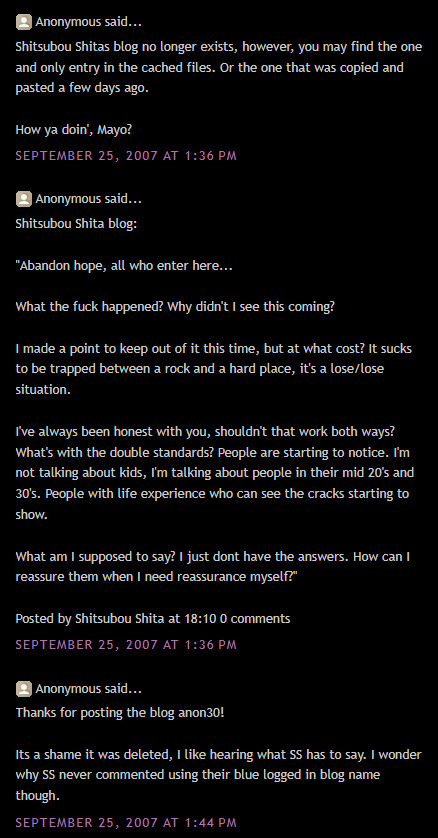

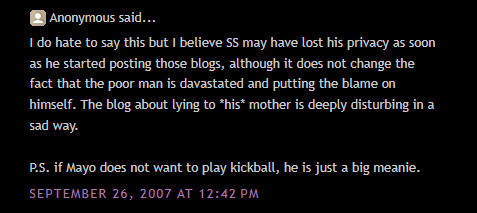
on the next page, an anonymous comment is posted which fans immediately begin to speculate is SS (frank). again, if you click the link you can get way more context than i'm able to provide here.
this insinuates that SS frequented the comments on mayo's blog, which i don't think he would have done without believing/knowing mayo is gerard
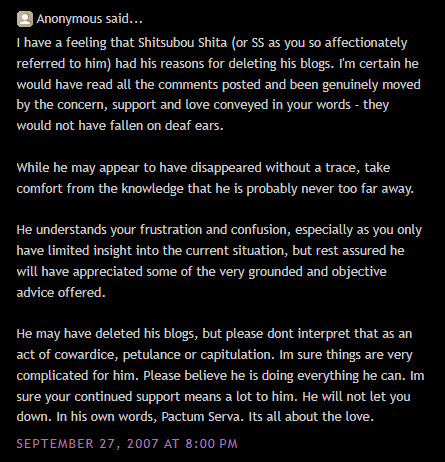

there was a lot discussed in this thread including pretty solid evidence that frank/ss wrote the ancient and historic "eliza post"
if you are not aware of the eliza cuts drama, that's a totally different and equally as insane rabbit hole you'll have to research on your own
tldr; she is gerard's mentally unstable ex-fiance who he was engaged to very shortly before lindsey
gerard and eliza got engaged on may 22, 2007 (the last show of the black parade tour) according to this reddit comment.
the "eliza post" went up on june 4, 2007. here is the post in its entirety:
"Hi I felt I had to write to you guys to allay some of your fears regarding the rumours and speculation surrounding Gerard and Eliza and the future of the band. This is the only time I will ever post. I will not be able to respond to your comments or enter into discussion or debate on what I'm about to say. We are aware that this is one of the most popular message boards for MCR fans and we know you guys are the most dedicated and loyal fans in the world. It saddens me to see such division amongst the fans over one woman. If it's any consolation, you guys are not the only ones affected. She is merely tolerated by both band and crew. Believe me, nothing anyone can say will change his mind. She's been the cause of numerous conflicts and while we dont have to like it, we have to accept it, at least for the forseeable future. From day one this woman has had a hidden agenda - her manipulation knows no bounds. Some of you may find this difficult to believe but I assure you I have personally witnessed the two sides of this woman. Her so-called 'good deeds' are nothing more than PR exercises for his benefit. But he does not see what goes on behind closed doors. We have tried to draw his attention to her blatant self-promotion and diva demands. This is a prime example of love being blind. His feelings for her do run very deep. Her feelings for him, however, are questionable at best. Many people believe, including myself, that he is being used as nothing more than a stepping stone. It's disheartening to see someone you care about and have worked with for a very long time change as a person, becoming more detached and causing the group dynamic to change as a result. There have been conflicts and differences of opinions and compromises have had to be made She does not accompany the band on the European legs of the tour. Since being on this current European leg, he seems much happier which suggest she doesnt make him as happy as he thinks. Despite being asked more than once to remain discreet, she blatantly disregards his wish to keep his personal life private by continually fuelling the internet hype. The band has always been about the music and the fans. This will not change. MCR have never endorsed any type of clique as it encourages and promotes the kind of high school mentality that MCR have always fought against. Your continued support is appreciated and rest assured this woman will have no adverse affect on the band and the music. For obvious reasons I am remaining anonymous. Eliza, we know you trawl these message boards and you probably know who I am - but I'd like to see you try and prove it!!!"
it's clear that whoever wrote this had a very strong distaste for eliza and was deeply troubled by the idea of gerard marrying her. based on the language used and style of writing, i strongly believe frank wrote this post. i'll be circling back to this in a minute, because i have a little more to go over.
for more evidence that SS is frank, we can reference this reddit comment made just 9 months ago by someone heavily involved in the blogspot community at the time, kapunua. their username on this post is "ReallyKapu."
if you read through the comment links I provided earlier, you may see their name pop up. they are also mentioned by name on the "iamthemodernprometheus" blog. if you also search "kapunua mcr" on google, you can verify their involvement in the blogspot community at the time.
kapunua is also mentioned in its-mayonaise's post here (no screenshot provided for this one, its just a small mention)
there's also a screenshot of a different comment kapunua made about 9 years ago with similar information. i found the screenshot here.


evidence that "mayo" is gerard
as mentioned in the post above, mayo often used british english syntax in his posts. he also posted about some pretty juicy stuff including a blowjob poem (you can seek that out yourself)
using british english isn't out of the ordinary for gerard. he often used an accent on stage during this time. moreover, he is a writer who has written multiple characters with this type of accent, showing he has a certain appeciation for it. i think his persona for the "mayo" account could been a sort of character he put on to disguise his idenity.
if you decide to view mayo's blog, you'll see each post has nothing but comments from mcr fans exclusively. i find it very interesting that the writer of its-mayonaise never bothered to make a post saying "hey, btw, i'm not gerard" in the 4 years this blog was run for
we have somewhat less definitive evidence that gerard is mayo. however, it is clear that at the very least, they had to have been someone involved with MCR or their crew at the time.
mayo makes a post alluding to their identity here, which you can find in the first screenshot below. this section sounds a lot like something gerard would write:
"I have been asked to reveal myself to you. You all know me. I am whoever you want me to be, I am an artist, a poet, a singer, a motherfucker, and a contradiction, a mouthpiece, a friend, and an enemy, a brother, an informant, a whipping boy, a basket case, a queen, and a criminal...(credit to John Hughes.)"
there are THOUSANDS of comments, many of which speculate the identity of mayo on each of his blogspot posts. you should definitely do your own detective work and see what you think, because there is far too much info to go through here.
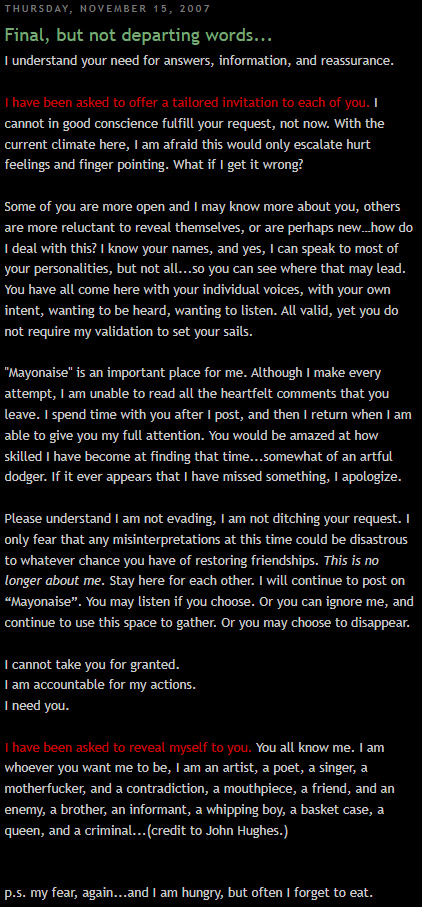

a frerard theory
as i previously mentioned, frank had deleted his original blog for shitsubou-shita in late september. however, prior to this, he made and then deleted some particularly turbulent and questionable posts
for context, the frerard fight happened on august 22, 2007, and gerard and lindsey got married on september 3, 2007 (just four months after gerard was engaged to eliza)
gerard and lindsey are married on the last night of the projekt revolution tour.
mcr takes a break for one month after this, where we can probably safely assume that freshly-married gerard and frank did not plan on seeing one another.
i think this was very troubling for frank for many different reasons. gerard had just freed himself of the eliza situation and here he was making the same mistake again. he was on the verge of losing his dearest friend yet again, and i believe that despite his best efforts, he could not get through to gerard.
obviously, gerard and lindsey are still married to this day. however, many fans might be aware of what happened between her and mikey. there's also a lot of other questionable information about lindsey circling the web, but that's a different story for another time.
weeks later, similarly to the eliza situation, shitsubou-shita makes and deletes the following posts on his original blog (this was prior to the creation of iamthemodernprometheus):
Friday, September 21, 2007 Abandon hope, all who enter here... What the fuck happened? Why didn't I see this coming? I made a point to keep out of it this time, but at what cost? I'm trapped between a rock and a hard place, it's a lose/lose situation. I've always been honest with you, shouldn't that work both ways? What's with the double standards? People are starting to notice. I'm not talking about kids, I'm talking about people in their mid 20's and 30's. People with life experience who can see the cracks starting to show. What am I supposed to say? I just dont have the answers. How can I reassure them when I need reassurance myself?
he says "i made a point to keep out of it this time" which seems like a reference to the situation with eliza i mentioned previously. he alludes to the idea that fans are beginning to notice the band's dynamic is not the same anymore. this was specifically around the time when "frerard" moments came to a pretty abrupt end.
he says "i've always been honest with you, shouldn't that work both ways?" which can be interpreted in a few different ways. he may feel deceived due to his best friend's sudden marriage. however, the intensity of the language used in this post shows he probably had some very intense feelings toward the situation.
it seems like the writer was having a considerably difficult time coping with these feelings. a day later, this post is made:
Saturday, September 22, 2007 Sticks and stones may break my bones but words will never hurt me. Bullshit. I've always been a smart ass, even as a child, although my mom would prefer to use the term precocious. I've always had trouble keeping my mouth shut, I'm an open book, completely ingenuous - secrecy and circumvention are not my style. But then I've never experienced extreme paranoia. So I'm writing this blog. I know you will never read it, I wouldn't want you to. Not everything is about you. This blog is for ME, a perverse catharsis, I need this right now to preserve the small amount of sanity I have left. A blog fuelled by disappointment, frustration, confusion and dejection. I am not laying the blame at your door. The burden of blame is mine. I didn't speak up soon enough. I didn't want to rock the boat, I've been there before. I didn't want to fight or endure days of being given the silent treatment. Its not fair on the others. Why do you always make everyone feel like they have to take sides? If I had been a better friend, I would have stepped in regardless of the consequences. I acted selfishly because I didn't want to lose you, but ironically, I may have lost you anyway. I meant every word I said at the diner and although I didnt show it, your smirk and glib response hurt me more than you will ever know. I don't know who you are anymore. I cant seem to find the right words. Nothing I say seems to reach you. You are wrong. I DO care. I love you. I refuse to give up on you and I refuse to let you push me away. I am going to fight for our friendship, you aren't the only one with a stubborn streak. We are in this together, for the long haul, I promise. I want my friend back. I miss him.
it seems like whatever the writer is feeling toward the subject of this post goes beyond the boundaries of a typical friendship. the final paragraph says everything we need to know.
we can assume that based on this post's mention of meeting a diner, that frank and gerard likely met up during their month-long break to talk about the way things went down
lastly, i know there's at least one interview floating or blog post around where frank says he was a difficult teen and a pain in the ass as a kid, but i can't find it right now. if anyone has the link to that i would love to add it here, because i remember it sounding pretty similar to that first paragraph.
Sunday, September 23, 2007 Is the pen really mightier than the sword? And so you continue to blog, as do I. The difference is, I am not hurting anyone. I'm just trying to gain some perspective while you are publicly making a fool of yourself. Your words are hungrily devoured and dissected by the masses, you seem to revel in the chaos and controversy. At the moment your identity is pure speculation, but have you thought about the consequences if anyone was able to prove your identity? Not just for you, but for all of us? Have you lost your mind? How can you be so selfish? You have become a self obsessed megalomaniac. I know what I get out of writing my blogs - but what do you get out of writing yours? Do you even bother to read the comments? Some of those comments break my heart. These aren't just nameless, faceless strangers, these are real people with real lives and real feelings. These are the people that allowed us to bring our music into their lives. These are the people that we see on tour, the people that wait outside for hours in the cold and rain just to meet us, the people that write us letters and make us scrapbooks, the people who care enough to bake us cookies and brownies, the people that send us birthday cards and bizarre, crazy ass gifts, the people that have given us their love and support, the people that cheer us on, the people that made us. Why are you so hellbent on destroying not only yourself, but everyone who loves you? You wanna see how far down I can sink? Your mom called last night - and I lied to her. After everything she has done for us, I lied to her. How do you think that made me feel? Do you even care?
this last post, for me, solidifies the identities behind each blog. it is so clear through the details in this post. to me, it seems like frank was hurting so bad, and in such a vulnerable place, that he completely let his guard down and made this post.
the mcr lyric included "You wanna see how far down I can sink?" is undoubtedly mind-boggling and speaks volumes to how carelessly obvious frank was (maybe intentionally?) willing to be
there's so much to unpack in this post and i honestly can't even begin to wrap my head around it. i would love to hear anyone's opinion!
later in the post, it seems clear that he is referencing the iam-mayonaise blog and gerard's seemingly wreckless posting. but mostly, i think he was lashing out due to pain of betrayal after losing the closest person to him and someone he deeply loves not once, but twice.
again, it's hard to believe how obvious he was being here, but i really think it was a result of the pain/suffering he felt
if you scroll back up to the first screenshot of this post, you can circle back around to when he removed his entire profile after making this final post, eventually rebranding to "iamthemodernprometheus"
the its-mayonaise account makes this post on september 30, seemingly as a response. the title could apply to frank, who as we all know, was gerard's best friend and right-hand man. the rest of this post can be interpreted in many different ways, so you can make whatever you want out of it:

however, the last paragraph does give me pause... i would love to see/create a full analysis of this post, but i'm trying to stick to facts here so you can form your own judgement
after gerard's wedding and mcr's month long break, they play two shows in mexico (oct 4 & 7, 2007) and then the hoboken show takes place, where frank yells "lie to me" during i'm not okay and seems very low energy and unlike himself
i believe things gradually improved between them after this point, but i'm not sure if their connection was ever completely the same.
conclusion/my opinion
coupled with all of the other available evidence about gerard/frank's tumultuous friendship/relationship/situationship, i think this information strongly alludes to the idea that at the very least, frank had some very intense feelings for gerard that were not fully reciprocated. i would love to hear what anyone else's opinion is on this topic, because it definitely isn't discussed often
i think it's completely heartbreaking (especially with everything else we know) but i do think their incredible connection is a massive contributing factor to mcr's legacy
if you notice any inconsistencies in this post or have any questions, please send me a message! i want to keep this as consistent, comprehensible, and well-sourced as i can!
lastly please follow me if you liked this! i spent months researching and compiling sources for this post and i would so appreciate it <3
#frerard#my chemical romance#mcr#gerard way#frank iero#frerard theory#ss/mayo#ss mayo#shitsubou-shita#its-mayonaise#mcr history
95 notes
·
View notes
Text
In Defense of Spirits
Or, alternatively:

I. Introduction
Spirits are one of my favourite parts of the Dragon Age lore, but they didn't start that way! Initially with Origins the various demons I fought I considered little more than cannon fodder, enemies put in my way to cut down so I could move on with my mission. With the introduction of Justice in Awakening and Dragon Age II coupled with Merrill’s alternate perspective also introduced in the latter, my feelings about them started to change. Solas and Cole crack those feelings wide open come Inquisition, and when replaying the games I found myself questioning the motivations of encounters with people I once considered one-note enemies.
I wanted to compile a list of these alternate readings of the various spirits we meet throughout the series, starting first with Origins. I'll be detailing some common themes and, where it’s appropriate, to defend their actions. This list is not comprehensive as there are some encounters I don’t consider significant or interesting enough to mention, although if someone’s curious about a particular spirit I’m happy to oblige. For the purposes of clarity, if I use the word “spirit” I am still referring to all denizens of the Fade, whether they call themselves Pride or Compassion. I may use the word “demon,” as a treat.
The purpose of this retrospective is to reflect upon the motivations of the spirits we kill through the series and how I think Bioware successfully created a world where, in this instance, we were sucked into their preconceived biases regarding spirits. And hopefully to make you feel as bad as I do when I’m forced to kill spirits who probably are better people than my player characters. I am also not arguing that everything I put forth here was intended by the writers. I have the reach and flexibility to pull out threads they didn’t expect me to.
Finally, this won’t be an exhaustive examination. There are a lot of spirits and some don’t invite discussion on my part.
II. Analytical Lens
There are several recurring themes that will crop up when I’m recontextualising the motivations of the spirits throughout the series. We’ll be going over these in detail as we talk about individual spirits, but for now:
The Veil is a construct. There was initially no barrier stopping them from moving back and forth freely, and in many ways their desire to manifest physically outside the Fade is a natural inclination. The problem being that going there and back again isn’t as easy as it once was.
They don’t understand this world. Again, I think the presence of the Veil exacerbates this. Time and again we see spirits who do have enough will to manifest safely have difficulty adjusting.
Trying to help hurts. Spirits can’t sicken with Blight or the common cold (that we know of), but intense emotions or cruel intentions can twist them from their purposes. Those who reach out in the honest urge to help may find themselves burned, sometimes through no fault of either party.
Their design encourages dehumanisation. For lack of a better word, considering this is a land of elves, dwarves, qunari, and so on. Many of the spirits we’re asked to empathise with are humanoid, with those we are at odds with being more likely to be monstrous or animal in design, making it easier to justify why we need to choose violence.
III. Dragon Age: Origins
Mouse
Mouse is among the first spirit players will meet in Dragon Age, depending on whether or not they play the Mage origin or not. Narratively he is meant to introduce the player to the role spirits often play in the lives of mages, that is to say: an evil that is not always self-evident. He tells a sympathetic lie, presents himself as someone who was once in a position like the protagonist currently is, and wants to make sure they don’t end up like him, only for it to be revealed that the entire reason he’s there is to possess them. At least, nominally that’s his role. A second pass at Mouse’s actions does raise questions as to his true intentions.
Throughout the test Mouse encourages two things within the protagonist: their self-worth and their questioning of the ritual. The former makes sense, he is ultimately revealed to be a spirit of Pride and so to stoke the protagonist’s own pride may inflate their confidence to a point where they can’t see the potential harm in dealing with him. Still, in a society where magic is feared and mages prisoners, there is something radical in encouraging that in someone. Especially when paired with remarks Mouse makes where he questions the logic of the Harrowing itself:
“It isn’t right they do this, the Templars. Not to you, me, anyone.”
This is one of the first things he says to you, and is one of the first pieces of Circle critical rhetoric in the entire series. From the perspective of the protagonist at the time, it would seem he’s referring only to apprentices, but is he? Spirits are drawn into the Harrowing as much as mages, ostensibly willingly with the promise of a body to possess, but we see in rituals such as the one that drew Wisdom into the world that the Circle isn’t above shackling spirits into doing their bidding, be it as a means of protection or garnering information. Once inside, they’re subject to the will of the apprentice, who have been taught to fear and mistrust the Fade since they were first brought to the Circle. So is Mouse expressing bitterness about the situation of the apprentices, or is he looking at the situation as being equally unfair to all involved?
Furthermore, what’s most interesting about Mouse is he never actually tries to possess you. He makes some requests, which Surana or Amell can’t agree to, but even if you avoid catching onto his game for as long as you can it never goes farther than that. He reveals himself as the final test and before the Harrowing ends he dispenses the to-be Warden a warning:
“Simple killing is a warrior’s job. The real dangers of the Fade are preconceptions, careless trust… pride. Keep your wits about you, mage. True tests never end.”
A piece of wisdom, if you will.
I don’t believe Mouse ever truly intended to possess you, although it’s impossible to tell if he truly would or not without the ability to agree to his bargain. He gives up the game too quickly, with the Warden only needing to vaguely doubt his story before he reveals it. By following the Warden through their Harrowing he helps them successfully bargain with spirits like Valor and Sloth and safely introduces the idea that not everything here is as it seems. Rather than being purely a Pride demon, I think Mouse is a spirit of Wisdom influenced by the Warden’s preconceptions towards what some might call the darker aspect of the values he represents.
While I don’t think it’s out of the realm of possibility that Mouse was exactly what we’re led to believe, nevertheless I believe it probable that spirits aren’t always gleeful participants in the Harrowing and that the rite is damaging to them as well as the apprentice mages.
Desire
We go now to another spirit from the Circle, specifically the Desire demon we meet in the Broken Circle quest. When we come across her she’s possessed a Templar and letting him live out a fantasy of having a wife and children. When the Warden and their party come across her, she argues that she’s giving him what he wants and doesn’t see the harm in it. Upon my first playthrough I took this as a lie and killed her, although it was difficult not feeling bad, as from the perspective of the enthralled Templar he died defending his family from bandits. To him the Warden was unequivocally the bad guy, and it’s tragic thinking about what his final thoughts might have been.
As for Desire herself, I think there’s an argument to be made that she simply didn’t see a difference between her making a life for herself and the Templar all within his head and a physical, lived life. We see in Inquisition especially, where we talk to more spirits, that the nature of the physical world is as alien to them as the Fade is to mortals. Command wonders out loud why the rocks do not move at her command, and Cole asks Varric to talk to his shoelaces for him because they “don’t listen to him.” They existed in a world where will mattered more and where dreams were real, so it stands to reason that to Desire there is no discernable difference between giving him what he wants for real and dreaming it.
Interestingly, you can choose to let them both go, and we get no indication of where they go from the Circle. Leliana also approves because she thinks what counts is that he’s happy. Personally I don’t feel there’s a right option in this quest as either leaves the Templar in a tragic spot, but I do think the Desire demon’s motivations aren’t as evil or manipulative as they seemed on my first playthrough.
Lady of the Forest
The Lady is perhaps the first spirit in the series given a more complicated character than “spirit good, demon bad.” We have Valor in the mage origin, Wynne’s spirit of Faith, etc, but they aren’t given much characterisation and their benevolent nature is taken as a matter of fact. We have a biased introduction to her, we see the damage she has done to Zathrian’s clan and hear his side of the story. We go into the forest to carve the heart from her chest.
But when the time comes to actually speak with her, his bias and deception is plain. She has all the trappings of a demon: summoned at a point of great tragedy, as a tool of vengeance, enacting a literal curse upon Zathrian’s enemies. Yet now she is an advocate for non-violent solutions, only compelled to violence by desperation (she sent letters but Zathrian left her on read) or by the player’s encouragement (potentially). I do think this was an end she worked towards, and didn’t come by naturally, saying to the Warden at one point:
“Then the time has come to… set our rage aside. I apologise on Swiftrunner’s behalf. He struggles with his nature.”
While she is speaking of Swiftrunnher, given she is the curse’s origin, I think the same could be said of her nature (as it is her curse). Zathrian implies much the same, saying to her:
“Your nature compels it, as does mine.”
I think it’s very likely that had we encountered the Lady those hundred years ago when she was first made, she would have been to our eyes a demon, rather than the semi-benevolent force of nature she appears as in-game. Interestingly, her outward nature doesn’t change if she is compelled to kill the Dalish. She isn’t thrilled, but neither is her nature twisted. She’s pretty quick to move on, afterwards. Of the major spirits in DA:O, I do think she is an outlier in the series. Killing her is the bad option, especially when a mutually beneficial solution is forced upon you. She also has a stronger presence of mind than many of the other spirits, perhaps accounting to her age and the fact that she is tethered to the world through not only Zathrian but her ‘followers.’ It’s fitting that the Dalish quest is the one where a spirit is presented not only sympathetically, but (as far as I can tell) exclusively referred to as a spirit whether they are doing right or wrong.
Rage
We meet many Rage demons in Origins, and throughout the series, but the spirit I’m referring to are the ones we meet in the Alienage’s orphanage. The recent site of a massacre, the orphanage is now home to a spirit of Rage who attacks those who enter. Rage, I thought, was a curious choice, when Despair and Terror exist. Although the fact that they probably didn’t want to make a new spirit model for this one sidequest would probably explain it on a development level, but then I wondered— whose rage?
The spirits don’t seem to embody the rage of the people who massacred the orphanage, or even the rage of the victims. They tell the Warden and Ser Otto that they “do not belong here” and one is furious that the party has killed “my brood.” I think the presence of the spirits here is indicative of how helpful or benevolent spirits can be twisted by the horrors of our world, that they were drawn by the misery of what happened at the orphanage and upon witnessing it they became enraged. They are ultimately protecting nothing, just an empty building that’s probably best torn down or cleared out, or whatever the elves of Denerim’s Alienage decide they need to properly mourn. Yet as we walk through the building the screams of children still play around us, it’s still happening for its current residents.
In the final encounter of the quest, the Rage demon targets and kills Ser Otto (assuming those mabari you encounter like two minutes in don’t get him first, like they do for me every time if I’m not paying attention) first out of your entire party. It makes sense, although his motivation was pure, he is representative of the human justice that allows horrors like this, and what’s more— how many orphans were taken from the orphanage’s midst by people wearing armour just like his, never to return?
The rage demons had every right to be angry, even if their anger manifested in a harmful way. The tragedy is that, outside of Denerim’s Alienage, most people weren’t.
IV. Other
These are spirits whose roles I don’t have much to say about, for one reason or another.
Kitty. I don’t have much to say about Kitty, who as a reminder is the spirit held captive in the basement of Wilhelm, the former master of Shale. Given Kitty can agree to not possess Amalia, content simply to be free of the basement, and then doubles back on that promise once you complete the puzzle, I don’t have the highest opinion of Kitty. However, can I do want to point out that Wilhelm held Kitty captive in his basement for decades for his research. Research which, by the way, was to find ways to prevent mages from becoming possessed. A little ironic that he essentially possessed a spirit to do so. I want to point this out only because I think it highlights how spirits are casually used by people and at no point do we stop and wonder what decades of being locked up in a basement outside of their intended realm of existence might do to someone, even a metaphysical someone.
Herren. The merchant and life partner of the blacksmith Wade, who may have made your Warden some nice armour from all those endangered dragons they killed. In the Darkspawn Chronicles Herren is fought— as a desire demon. Gaider says this is not canon, but he doesn’t even go here anymore, so instead I’d like to put forth the idea that Herren is a desire demon taken physical form who lives out his existence peacefully (if somewhat grumpily) with his eccentric husband. I have no evidence of this being a fact, in fact I have the opposite of evidence, but I like my version better, so.
The Grand Oak. I think everyone with a modicum of taste likes this guy, but I do think he's an interesting lens to look at how spirits in Elvhenan might have lived. I like to think all of them had a period where they just vibed as a tree for a hundred years or so.
#dragon age#dragon age meta#dragon age lore#dragon age: origins#lady of the forest#mouse dragon age#long post#my writing#i have no idea what to tag this tbh
191 notes
·
View notes
Text
I Saw Solas's Origin in an Achievement Icon and It Opened My Eyes on 15 Years of Lore
— PART FOUR: if you haven't read previous parts, do it now! —
[ 1 ] [ 2 ] [ 3 ] [ 5 ] [ 6 ] [ 7 ] [ 8 ] [ 9 ] [ 10 ]
Welcome, friends and travelers! I wanted to get some thoughts recorded before Veilguard's release so I could see if I am right about an absolute BOATLOAD of theories I have.
In short: I saw the achievement list when it was released. I have seen the backstory hints for Solas included in said list. AND MY MIND WAS BLOWN.
You have been warned: THIS COLLECTION OF THEORIES INCLUDES SPOILERS FOR EVERY DRAGON AGE GAME AND ALL PROMOTIONAL MATERIAL UP TO AND INCLUDING OCTOBER 18, 2024.
Come sit down with me. Make a nice cup of tea (and hide it from Solas). We've got a lot of unpacking to do.

(this photo isn't the spoiler, I just like it.)
Today's Discussion: What the Chant of Light Confirms about Solas, Mythal, and the Evanuris at large.
Ohhhh boy. Here's where we're really getting into the, 'If you haven't read the previous parts, you NEED to go do that, otherwise what I'm about to say will make a lot less sense,' portion of this series. So seriously: the previous parts are linked above. Go look at those.
Caught up? Good.
Today, we're going to look at how closely the Chant of Light follows everything I just talked about with Titans, the Fade, spirits-as-thoughts, and Solas-as-lyrium-spirit. For this exercise, I'll mostly be drawing on material that I have access to (both volumes of World of Thedas, plus my knowledge from all three games) but supplementing with what the Dragon Age wiki has compiled, as well.
Rather than go through the Chant from beginning to end (as I simply lack the space here), I'm going to break it down into topics.
Our topics are as follows:
Who—and What—Is the Maker?
The Word "Forgotten" in the Chant
The Maker's First and Second Children
The Jealous First Children: Demons Seeking to Conquer the Earth
Archdemons and Titans
Yes, I Have to Talk About Shartan
Veilguard Predictions Based on the Chant of Light
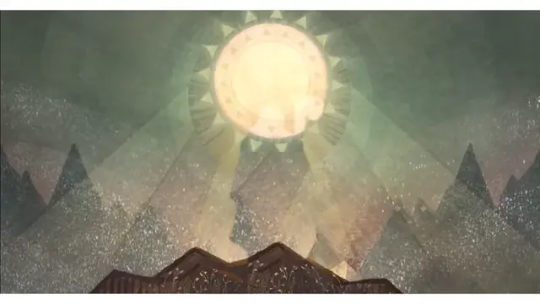
Who—and What—Is the Maker?
For anyone who hasn't gone through the whole thing and read every verse, let me begin by saying: the Chant of Light is a story writ by many hands over the history of Thedas. Some of it is (allegedly) written or recorded from Andraste herself, but many verses are taken from outside sources—even adapted from other cultures' legends.
But overall, it is a story that the Andrastian faith believes in: one with approved verses that the Chantries teach all their faithful. The Chantry has been a brutal organization throughout Thedas's history, but I still find value in using the Chant to piece together different takes on Thedas's ancient lore. Whether the events happened as described is up for debate, but they are historically significant, and I would argue that they contain kernels of truth no matter if one believes in the prophecies from Andraste or not.
To properly discuss whether the Chant follows my theories, we first have to ask ourselves: what does the Chant suggest that the Maker is? To do this, we have to look closely at its creation story, and from the eyes of the one who supposedly witnessed him: the Canticle of Threnodies, and the Canticle of Andraste.
Right in Threnodies 1, it says this:
(4) From the waters of the Fade you made the world. As the Fade had been fluid, so was the world fixed.
Immediately, we can see that lyrium plays a major role in the Chant's creation story. If that's true, then the possibility exists that the Chant aligns at all with any of my prior theories. If that is the case, then the Chant of Light might aid us in predicting what's to come in Veilguard—especially with characters like Solas, so intertwined with Titan lore and lyrium.
From here, I went looking for additional references to the Maker, namely in Andraste 1.
(8) Lo! My eyes open'd, shining before me Greater than mountains, towering mighty, Hand all outstretch'd, stars glist'ning as jewels From rings 'pon His fingers and crown 'pon His brow.
The Wellspring of All said, "None now remember. Long have they turned to idols and tales Away from My Light, in darkness unbroken The last of My children, shrouded in night."
"World-making Glory," I cried out in sorrow, "How shall your children apology make?
Of course, we cannot forget one of the Chant quotes that Inquisition made famous!
(11) Here lies the abyss, the well of all souls. From these emerald waters doth life begin anew. Come to me, child, and I shall embrace you. In my arms lies Eternity.
Through all of these examples (and more that I simply do not have time or space to cite, with Veilguard so close), I can tentatively conclude: the Chant of Light is likely hinting to us that the Maker is a Titan.
But to test this theory, I wanted to go one step further. I wanted to see if the Chant of Light would suggest that the Maker is one of the Forgotten Ones.
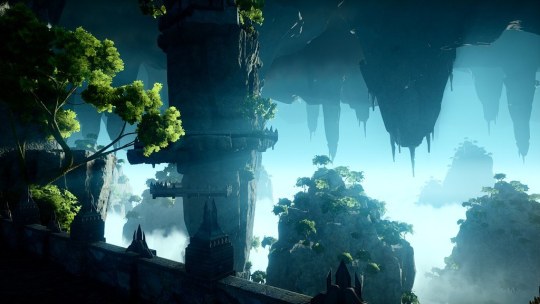
The Word "Forgotten" in the Chant
To accomplish this next piece to the best degree possible, I actually moved the entire known Chant of Light into a google doc. Here's what I found when I looked for applicable mentions of forgot/forgotten.
(4) From the waters of the Fade you made the world. As the Fade had been fluid, so was the world fixed. (8) And so we burned. We raised nations, we waged wars, We dreamed up false gods, great demons Who could cross the Veil into the waking world, Turned our devotion upon them, and forgot you. —Threnodies 4.
We'll get to those "great demons" in a moment, but for now I want to draw attention to: "Turned our devotion upon them, and forgot you." That's one mention of the Maker being forgotten, in the first stanza we know from the Chant.
The Maker appears to Andraste (7) Eyes sorrow-blinded, in darkness unbroken There 'pon the mountain, a voice answered my call. "Heart that is broken, beats still unceasing, An ocean of sorrow does nobody drown. You have forgotten, spear-maid of Alamarr. Within My creation, none are alone." — Andraste 1
This comes from the first stanza of the Canticle of Andraste, and describes the first time the Maker appeared to her. She is describing what she is seeing: "There 'pon the mountain, a voice answered my call." She is evoking mountain imagery here, and even though she doesn't mention an abyss in this verse, it does come up elsewhere in the Chant (as we have seen).
That, and the Maker speaks to her: "You have forgotten, spear-maid of Alamarr. Within My creation, none are alone."
For one, we have a mention of forgotten, again. But perhaps even more crucially, we have this concept of "none are alone" within the Maker's creation. With everything I know now, I'm thinking of the concept of Isatunoll: the hive-mind feeling experienced by Dagna, Valta, and Harding.
(13) "World-making Glory," I cried out in sorrow, "How shall your children apology make? We have forgotten, in ignorance stumbling, Only a Light in this darken'd time breaks. Call to Your children, teach us Your greatness. What has been forgotten has not yet been lost." (14) Long was his silence, 'fore it was broken. "For you, song-weaver, once more I will try. To My children venture, carrying wisdom, If they but listen, I shall return." — Andraste 1
Another mention: Andraste addresses the Maker as "World-making Glory," which references the saying that Titans were the first Shapers of the world. Then, she says: "We have forgotten [...] Call to Your children [...] What has been forgotten has not yet been lost."
Again: references to the Maker as a being that was forgotten. Another reference to lyrium, in asking the Maker to call out to people. This reference is further enhanced with the Maker referring to Andraste as "song-weaver," suggesting that these songs are how she can speak to the Maker.
And to top it all off: "What has been forgotten has not yet been lost" is answered with, "If they but listen, I shall return."
Listen, for so long, made me think of commandments. Listening to the Maker's will. But now? Now I think we're supposed to think of listening to the Maker's song.
(3) I have heard the sound A song in the stillness, The echo of Your voice, Calling creation to wake from its slumber. (4) How can we know You? In the turning of the seasons, in life and death, In the empty space where our hearts Hunger for a forgotten face? — Trials 1
Just like Andraste has heard the song, the echo of the Maker's voice, calling creation to "wake from its slumber." It could not be more deliberate than that!
Another mention, also, of a "forgotten face."
To me, these mentions of forgotten affirm that the Maker is one of the Forgotten Ones, and is definitely a Titan. That tells me that, until I am proven otherwise, I can read the rest of the Chant of Light as though Maker-as-Titan is true, and can see what other developments stem from that initial truth.
Namely: What does the Chant say about spirits and people, in relation to the Titans?

The Maker's First and Second Children
To understand the (possible) creation of the spirits and the elvhen, we are back to the Canticle of Threnodies, stanza 5. The first of the Chant's Canticles, it's an introduction not just to the text, but to the world of Thedas as understood by Andrastians.
Again: it may not be a precise literal description of events, but I maintain that if the Chant of Light truly didn't matter, BioWare wouldn't have made it that long, or paid as much attention to cadence/meter as they did.
The crux of the earlier portion of this Canticle is that the Maker produced two sets of children, and the first eventually grew envious of the second (more on that later). For now, let's examine what is said of the creation of the Maker's first children.
(1) There was no word For heaven or for earth, for sea or sky. All that existed was silence.
I am going to interpret this one very liberally. It is not said that there were no heaven, earth, sea, or sky—but that there was no word for those things. That, I interpret to mean that there was no distinction between heaven and earth. Remember that, throughout codices from ancient elvhenan, "sky" often refers to the Fade, and "earth" often refers to the Titans' domain, the Abyss, or the waking world.
Either way: there was no Veil, and so there was no distinction between the Titans' domain and the Fade.
Then the Voice of the Maker rang out, The first Word, And His Word became all that might be: Dream and idea, hope and fear, Endless possibilities. And from it made his firstborn.
There are two things worth noting here:
the "Voice of the Maker" is something I interpret to mean the song of lyrium: the song of the Titan that the Maker is.
"Dream and idea, hope and fear/Endless possibilities" sounds a lot to me like the Maker is creating his first children with thoughts. Thoughts conveyed through the song of lyrium, maybe?
Originally, these "first children" famously showed no sense of ambition. They were given the Fade, but did not do anything with it. They only reflected what already existed. (Though I do want to note that this city apparently had lyrium for cobblestones.)
He called forth A city with towers of gold, streets with music for cobblestones, And banners which flew without wind. [...] But their songs Were the songs of the cobblestones. They shone with the golden light Reflected from the Maker's throne.
The Maker apparently realizes his mistake: only giving the spirits the Fade.
The realm I have given you Is formless, ever-changing.
But the solution to that mistake?
So the Maker turned from his firstborn And took from the Fade A measure of its living flesh And placed it apart from the Spirits, and spoke to it, saying: Here, I decree Opposition in all things: For earth, sky For winter, summer For darkness, Light. By My Will alone is Balance sundered And the world given new life.
The Maker took living flesh from the Fade. That's not the thoughts existing in the Fade; that's the lyrium from the Fade. To that living, now sentient lyrium, the Maker spoke, and declared opposition in all things.
Now sky and earth are separate things. The Veil is not yet created (we'll get there), but we have this concept of two opposing schools of magic, like earthbending and airbending (to forever keep with the A:tLA examples through this series).
So far, this is lining up with my previous theories. But, what, exactly, are the Maker's second children made of?
(5) And no longer was it formless, ever-changing, But held fast, immutable, With Words for heaven and for earth, sea and sky. At last did the Maker From the living world Make men. Immutable, as the substance of the earth, With souls made of dream and idea, hope and fear, Endless possibilities.
Now, the waking world is immutable, and there is opposition in magic. And from that opposition, the people are created. Not humans, but people. Their bodies are "immutable, as the substance of the earth" (meaning lyrium, I believe), "with souls made of dream and idea, hope and fear/Endless possibilities."
The exact same phrase: the Maker's thoughts are the souls of his second children, just as they were the first children's entire being. This proves that the people of Thedas have spirits for souls, but also that all spirits come from the Maker's thoughts.
When I tell you I almost choked, realizing that.
But I still want to ask the Chant of Light: in all this story, where do we find the Evanuris?
And the Chant has answered in full.

The Jealous First Children: Demons Seeking to Conquer the Earth
When I first read the Chant of Light, I had not pieced together that heaven and earth were synonymous with Fade and Abyss. Now that I have, I see the Evanuris plain as day in Threnodies 5.
(7) Now, with their Father's eye elsewhere, the firstborn At last created something new: Envy. They looked upon the living world and the favored Sons and daughters there, covetous of all they were. Within their hearts grew An intolerable hunger. Until, at last, some of the firstborn said: "Our Father has abandoned us for these lesser things. We have power over heaven. Let us rule over earth as well And become greater gods than our Father."
In the codices of the Trespasser DLC and the Temple of Mythal, there are constant references to the Evanuris wanting to tame or dominate the Titans, the "Void," or the "land." The ancient elves ask Elgar'nan to help them "tame the land." Mythal is praised for "striking down the pillars of the earth." The Evanuris, namely Mythal and Elgar'nan, carried on an endless war with the Forgotten Ones.
The Chant goes on.
(8) The demons appeared to the children of earth in dreams And named themselves gods, demanding fealty.
Remember part 2 of this series? Remember the Mythal lullaby from the Deep Roads portion of Trespasser? (I was lovingly informed about a small mistranslation, which I shall correct here.)
Ir sa tel'nal Mythal las ma theneras Ir san'a emma Him solas evanuris Da'durgen'lin Banal malas elgara Bellanaris, bellanaris. Isatunoll Mythal grants you dreams Lyrium within Becomes Solas evanuris Little stone boy Never granted (connection to many spirits) Forever, forever
Cole says, "He didn't want a body, but she asked him to come. He left a scar when he burned her off his face."
It sounds exactly like the Chant describes: Mythal feeding dreams to Solas, only to bring him into a body he did not want, and apply vallaslin (a geas?) that he did not ask for.
Therefore? The Evanuris are the Maker's first children, as far as the Chant of Light is concerned.
But I've still got questions. Namely: What came next?

Archdemons and Titans
As for the Evanuris's eventual fate—being imprisoned at the same time as the Veil was created? They've employed interesting wording.
And a mighty voice cried out, Shaking the very foundations of heaven: "Ungrateful children! I gave you power To shape heaven itself, And you have made only poison. As you crave the earth, the earth shall be Your domain! Into the darkness I cast you! In tombs of immutable rock Shall you dwell for all time."
I question who this "mighty voice" belonged to. I do not believe Solas is the maker, but I do wonder: was Solas acting in conjunction with his Titan here? During the exact moment of the creation of the Veil, he still would have had access to his non-sundered Titan. Would he still have heard the song/call, and made the Veil at the Titan's behest?
Regardless: this piece of the Chant speaks about the imprisonment of the archdemons in the Abyss, the same domain as the Titans.
It goes on to specify what happened next:
(11) Those who had been cast down, The demons who would be gods, Began to whisper to men from their tombs within the earth. And the men of Tevinter heard and raised altars To the pretender-gods once more, And in return were given, in hushed whispers, The secrets of darkest magic.
This serves to confirm a theory that I'd held for a long time: that the Evanuris whispered to the priests of old Tevinter through their archdemons. Trapped in their fade-jail, they could not act themselves, but may have used their archdemons as puppets in order to convince the Magisters to come open the door to the Golden/Black City, that they might be released.
Overall? It sounds like the Chant of Light exactly confirms every one of my theories on the Titans, the Forgotten Ones, spirits-as-thoughts, the Evanuris, and the Archdemons. I may not have been able to examine the entire Chant here (can you imagine how long this post would be if I did?) but what I have presented so far exactly aligns with my theories from the last instalment.
Now, the question you're all here for...
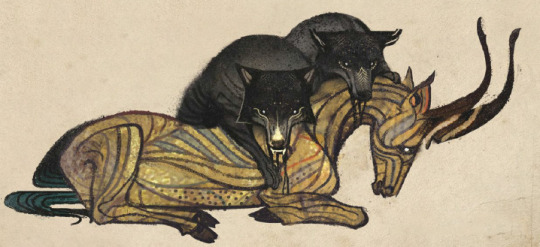
Yes, I Have to Talk About Shartan
I know, I know. Shartan is one of the most widely debated figures in the Chant. And I'm sorry to say, I'm no more sure than the rest of you.
But I've never quite believed that Solas himself is Shartan. He says he slept for millennia after the creation of the Veil, after all. But I cannot deny all that we know of Shartan: that he freed elven slaves, that he held fast in his convictions, and that he is rumoured to have been Andraste's lover.
It seems damning, doesn't it? Surely someone so invested in freedom must be Solas, especially an ancient elf who looks so much like Solas himself.
But what if Shartan wasn't one person?
(3) My Maker, know my heart: Take from me a life of sorrow. Lift me from a world of pain. Judge me worthy of Your endless pride. — Transfigurations 12
We can guess that the Maker is a Titan. We know Solas came from a Titan. We can guess that Solas was still able to hear his Titan when the Veil was created. We also know that there were many lyrium coffins in the Deep Roads during the Descent DLC. The Maker's first children whispered to many stone-spirits just like Solas.
We also know the Forgotten Ones are named by their qualities, just like spirits and demons.

The Maker instructs Andraste to carry wisdom to the people, that he might return. Who is to say that the Maker is not the ultimate Wisdom/Pride aspect, and we just haven't seen it confirmed yet?
And if there are many wisdoms and prides that are tied to the Maker-Titan, then there is absolutely reason to believe that any of those lyrium-spirits-turned-corporeal elvhen could strongly resemble Solas not just in appearance, but in convictions.
Two elven translations point me to this conclusion, as well:
Ar-melana dirthavaren. Revas vir-anaris: this is Fen'Harel's secret password for the spirits in Trespasser. I believe it loosely translates to, "I now promise knowledge. Freedom for we-Anaris." • This translation GREATLY interests me, because Anaris is the name of one of the Forgotten Ones. "We-Anaris" implies that there are many elvhen that come from Anaris, and these specifically may be the slaves Solas was trying to free.
Shar•tan: I believe, as with all the Evanuris, this name is actually a title. While I could not guess the meaning of the word "Shar," I do know that the word "tan" means "three." • I wonder if Shartan, therefore, is a collection of three people, potentially all from the same Titan as Solas. Anaris, maybe?
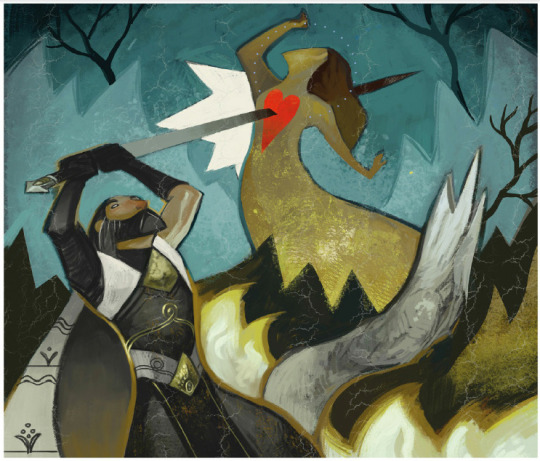
Veilguard Predictions Based on the Chant of Light
Whew! I have a lot of Veilguard predictions, but to keep this post from being tumblr-breakingly long, I'll keep this list to the ones that come strictly from the Chant of Light.
I believe we will find out more about the Chant of Light by not only being in Minrathous and knowing Neve, but by seeing the Chant's events referenced by the ancient elves and even in Solas's memories.
I believe we'll get, if not confirmation, at least a hint on whether Solas's Titan is the Maker.
I believe that, since Veilguard is all about prophecies coming true, that we will hear the "Voice of the Maker" ring out to us in Veilguard—likely through a Titan waking. • I'm going to bet that this is in or near Kal'Hirol, the thaig closest to Kirkwall, which is near where the red lyrium idol was found in DA2.
I believe we're going to find out more about the potential link between Andraste and Mythal (there are bajillions of theory posts out there about them; I didn't have time here!)
I believe we'll see an Archdemon's old prison and see how that (potentially) affected Titans and/or their hearts.
I believe we'll see someone who remembers being made out of lyrium—even if that someone is Solas.
---
As ever, if you got this far, thank you!! All your engagements on these continue to make my week.
Also: I am trying my hardest not to consume full-game-review spoilers! As these reviews go live tomorrow (10/28), you may see me not reading my notifications/replies, and appearing here only to continue posting my theories.
But if you feel like sticking around anyway, stay tuned for: The Evanuris Story So Far, As Best As I Can Guess It.
#dragon age#dragon age: the veilguard#veilguard spoilers#dragon age the veilguard#dragon age: the veilguard spoilers#datv spoilers#da:tv#da:v#da4#da4 spoilers#dragon age theory#dragon age meta#da theory#da meta#solas#the chant of light#evanuris#mythal
53 notes
·
View notes
Text
Self-Made Man: Jace Beleren and Representation for Transgender Men in MTG

INTRO:
A few days before I started writing this, I received a message on Tumblr asking me to talk about my personal interpretation of Jace Beleren as a trans man. Not an unusual request, since Jace Beleren is my favorite character and I mention that I think he's trans all the time. I thought my response would be easy to write, but I started typing and couldn't stop. I realized I couldn't keep it short and simple. My thoughts grew into something much bigger, and much more meaningful to me. (Word count: ~9260)
In this post, I'll explore my analysis of Jace Beleren as a transgender man, why I think it enriches Jace as a character, and how it relates to the topic of transgender representation in Magic.
Disclaimer 1: As far as I know, WOTC and the authors who wrote Jace's lore did not originally set out with the intention of portraying a transgender character in Jace. Everything I'm presenting as evidence that Jace is trans is just part of my analysis. The purpose of this post is not to prove that Jace was always intended to be trans, but to show how my personal interpretation of Jace as a trans man is inspired by and supported by the text.
Disclaimer 2: All transgender people are different and have unique lives and feelings and experiences, so the things I say in this post won't apply to every single trans person. The examples I give here are mainly based on my own experience, as well as those of other trans men I know personally.
(General content warning for discussions of bullying and transphobia.)
PART 1: ORIGINS
There's an inherent transness about Jace Beleren.
Insecurity is one of Jace's most visible and defining traits. From Origins to Ixalan, his long-term character arc is all about his struggle to let go of his insecurities in order to become a better version of himself. There are parallels to the experiences of transgender men in the way those insecurities came about, how he expresses them, and how he eventually overcomes them.
It's easy to see why Jace would be insecure. As a telepath, he can hear all the negative thoughts other people have about him.
=========
Sure enough, there was his father, sitting at the kitchen table, frowning. Gav Beleren, grubby and balding, regarded Jace with little more than weariness.
I wish he was normal.
His father’s thoughts traced a familiar path.
[Jace's Origin: Absent Minds - Kelly Digges]
=========
Lack-witted idiot.
A big lug shoved past him from behind.
Jace couldn’t help but agree with the sentiment.
I swear, that Beleren kid…
[Jace's Origin: Absent Minds - Kelly Digges]
=========
There’s the freak.
The biting thought was the only warning Jace got.
He scrambled to his feet and spun, but he was too late. Three of his schoolmates stood between him and the access hatch.
[Jace's Origin: Absent Minds - Kelly Digges]
=========
Jace's own father, despite caring for his son and wanting a better life for him, felt little warmth for him. He wished Jace were "normal" and often became frustrated with him. Jace was a victim of brutal bullying that started in early childhood and continued all through his school years. Even complete strangers disliked Jace, and they made it known.
It was difficult for Jace to tell which thoughts were or weren't his own. Jace's constant awareness of others disliking him caused him to internalize that negativity, and as a result, he developed a sense of insecurity at an early age.
Jace's insecurity manifests as self-hatred, feelings of inadequacy, and discomfort in his body and physical appearance. I think his insecurities manifested in these specific ways because one of his most significant personal struggles was gender dysphoria. In an R&D video about Jace's story in Origins, Kelly Digges spoke about Jace's insecurity, and unintentionally gave the most transgender-sounding response possible.
=========
"Not everybody likes Jace. They see the arrogant self-assured kid wearing the hoodie, and something about that doesn't sit well with them. But I think you've got to have sympathy for the guy. I mean, imagine being a teenager with all the awkwardness that comes with that, and actually knowing that the person behind you thinks your hair looks stupid! You'd put on a hood too!"
[Kelly Digges - Magic: The Gathering - Inside R&D Magic Origins: Jace]
=========
The thing is, I don't have to imagine that situation. That was literally my lived experience as a trans teenager.
I had known I was trans since I was very little, but I didn't decide to start living life as an openly transgender boy until I was 13 years old– right before I started high school. The day before my freshman orientation, my mom took me to a hair salon and I asked the stylist to give me a typical boy's haircut. My hair was waist-length, and the stylist was shocked that a 'girl' could ask her to cut off that much hair. She was scared to ruin my appearance by making me "look like a boy" (even though that's exactly what I wanted.)
My freshman photo was the ugliest school picture I've ever taken. My friends jokingly called me 'Gohan' (from Dragon Ball Z). I started wearing jackets with my hood up, even though I never liked to before, and I wore hats despite it being against the school dress code. I knew other people thought my hair looked stupid, and I knew this without having telepathic abilities like Jace.
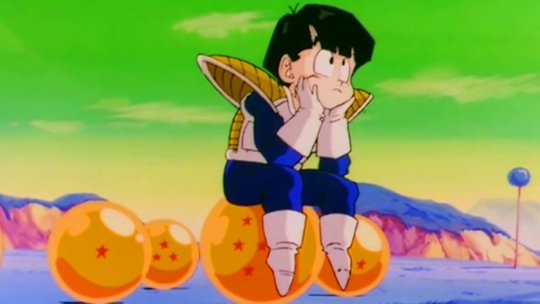
But my troubles didn't start with that haircut. Long before I started openly living as a boy, I was told I was a 'tomboy' and that I didn't act like other little girls did. Even in early childhood, I was very aware of the fact that some people hated me for who I was and how I expressed myself. I was just like Jace in that way– knowing who was judging me; knowing they didn't respect me; and knowing that in their eyes I was ugly, a weirdo, or worse.
I had always known I was different, and Jace had always known he was different, too. But it's not for the reason you would think. People mistreated Jace long before anyone knew or even began to suspect his true nature as a telepath. Nobody knew Jace was a mage, but everyone knew something was weird about him. There was something outwardly unusual about Jace that people noticed and thought was strange and undesirable.

Something interesting I noticed while re-reading Jace's origin story is that he appears to be wearing girls' clothing in the art. He and the girl, Jill, are both wearing the same long tunic / dress and shawl; while the two other boys are wearing vests and tucked-in shirts.
I know that wasn't necessarily the intention with this art, but it got me thinking about other aspects of Jace's origin story that just felt trans to me.
Interestingly, nobody in Jace's origin story actually calls him "Jace" except for his mother, the only person who truly loved and accepted him for who he was; and Alhammarret, another telepath and therefore the only person who could see Jace the way Jace saw himself. Everyone else refers to him as "Beleren" or "that Beleren kid" or "freak". His own dad doesn't call him anything at all.
It reminded me of the way my family never got into the habit of calling me my chosen name, even after I came out. They would call me my childhood nickname, "BooBoo", to avoid saying my chosen name or my birth name. To them, I was boyish enough it was weird to call me a girl's name, but not loved or respected enough to be called what I wanted.
Being a trans teenager is hard. It's hard to control your style when you're dependent on your parents to buy clothing. It's hard to control your identity when other people constantly call you the wrong name. And it's pretty much impossible to control your body.
Puberty is a source of insecurity for all teenagers, but it's the ultimate hell for trans teenagers. When the effects of hormones become visible and you see how your body has changed compared to your peers, the difference can be emotionally devastating.
While puberty made me wider and heavier; my male friends, who were going through the other puberty, got taller and more muscular. They got bigger and stronger every year while I was doomed to stay 5'0 (152cm) forever. It felt like I could never catch up– they looked the way I wanted to without even trying. Sure, I could pass for a boy, but they were going to grow up to be men. It infuriated me.
Similarly, Jace's lack of stereotypically masculine physical characteristics was a major source of self-hatred.
=========
“Hey, Beleren,” said the largest of the three, his booming voice overpowering the wind. His name was Tuck. At fourteen, he was a year older than Jace, a head taller, and built like a loading dock.
[Jace's Origin: Absent Minds - Kelly Digges]
=========
How small he looked, hanging desperately above the crackling stream of mana. How vulnerable he looked. He hated it.
[Jace's Origin: Absent Minds - Kelly Digges]
=========
Jace's male peers are described as being significantly taller and more muscular than him. This difference in size and strength made it easy for other boys to bully and physically abuse Jace, which caused him to associate their masculinity with the power they held over him. In Jace's mind, being a victim meant he was weak, and being weak meant he was less of a man. Hating yourself for things you can't control is extraordinarily painful.
When Jace discovered his true nature as a telepath, he realized it was the one way he held power over others. He tried to feel tougher and more masculine by emulating the way his bullies demonstrated their power over him– through intimidation, cruelty, and threats of violence.
=========
He looked Tuck in the eyes. “And if you harm my family, I’ll take your mind apart, one squalid little memory at a time.”
Tuck flinched.
[Jace's Origin: Absent Minds - Kelly Digges]
=========
Having grown up without any positive male role models in his life, Jace's idea of masculinity was primarily influenced by the mistreatment he endured. He simply imitated what he saw and he didn't have the emotional support or life experience needed to grow out of that mindset.
As a young trans man reading Jace's origin story, I found the way he resented his bullies and retaliated against them to be very relatable. It's scary how easily gender dysphoria can turn into toxic masculinity. When you need to try a million times harder than your cisgender peers to be acknowledged as a man, taking masculinity to a harmful extreme can seem like the logical thing to do, especially if you're a younger trans man.
Despite expressing myself exactly the same as any other little boy would (wearing the same clothes, liking the same cartoons, playing the same sports), I was bullied by both kids and adults for daring to think I could be a boy. Once, when I was 8 years old, I stepped up to bat for my Little League baseball team. When the announcer said my feminine name and everyone noticed the long hair sticking out from underneath my helmet, the opposing team's volunteer coaches (the fathers of kids my age!) shouted from their dugout: "There's no way they'll win! They have a girl on their team!" Their players laughed and cheered in response.
That absolutely broke me. Their words taught me that being myself wasn't enough. And if being the same as other boys wasn't enough, then I needed to be more than them. I intentionally became a bully. Picking every fight I could was my way of proving I was more masculine than people thought.
Intentional toxic masculinity in pursuit of gender-affirmation is a very common experience for young trans men. Jace and my younger self acted the way we did because we were trying to mask our insecurity. We wanted to kill the weakness we saw in ourselves, so we lashed out in an attempt to feel stronger than the people who hurt us.
Starting middle school let me get away from most of the people who bullied me. It was the fresh start I needed to stop being such a terror. But a clean slate wouldn't prove to be so helpful for young Jace.
PART 2: PLANESWALKER
At age 15, Jace's Planeswalker spark ignited. He arrived on Ravnica with no memories of his life on Vryn.
In theory, Jace's amnesia would have allowed him to start becoming the person he wanted to be, but he couldn't begin to heal because the scars on his subconscious mind were immediately opened. Being lost and alone made Jace feel vulnerable– the feeling he hated most.
=========
Came out of nowhere. Some poor Izzet experimental subject, probably.
He scrambled to his feet. People were staring at him. He looked as bad as he felt, sweaty and pale and filthy. He pulled his scarf up around his face and dashed to the side of the road.
I’m not an experimental subject. I’m…I’m…
I’m in trouble.
Fine. Table that.
He walked as fast as he could without seeming to hurry. He reached out, carefully, into the minds around him. It was a cacophony, a mad tangle of voices, and half of them weren’t even human.
Vagrant. Thief. Poor kid. Wretch.
His headache was getting worse.
[Jace's Origin: Absent Minds - Kelly Digges]
=========
On Ravnica, Jace had no idea where he was or who he was, and he was suddenly surrounded by more people than he'd ever been near before. After losing the ability to control his telepathy, he was overwhelmed with their thoughts. He didn't know any of the people around him, but he knew they thought he was strange and pitiful.
When Jace noticed people staring at him, he hid his face with his scarf and ran away from them. Jace's first instinctual concern was not that he was possibly in danger, but that people were perceiving him in a way that made him feel embarrassed about himself. Even without memories of being bullied, a part of Jace's mind was still constantly worried about his appearance.
Jace's anxiety in public reminded me of the extreme paranoia I suffered from as a trans teenager. Being seen and perceived was so unbearable to me that I went to extremes to avoid people. I'd stay home or hide whenever possible, and sometimes I became so anxious I would literally run away if I noticed someone looking at me. I've gotten a lot better in the past few years, but I still worry when I'm out in public. I often notice strangers staring at me, and I hate knowing when people are questioning my gender. In certain situations, I'm even worried that someone might hurt me if they notice I'm trans. When you're trans and you've been bullied, just being perceived is dangerous.
That initial experience on Ravnica did instant damage to his self esteem. Jace's discomfort in his body and physical appearance was such a pressing issue that he immediately sought gender-affirming body modifications.
=========
The Jace in front of her was pathetically young.
[...]
The teenage Jace seated in the chair had the look about him of someone who wanted to disappear and wish someone more imposing into his place. His outfit was disheveled, the cut of it unfamiliar. Vraska sensed in the fabric of the memory that this version of Jace had arrived in Ravnica for the first time only days before.
The Gruul shaman's hand was glowing brilliant white. "This your first?" he grunted.
It took Jace a moment too long to answer. "Yes," he said timidly.
Vraska couldn't help but smile at this memory. He was the wimpiest teenager she had ever seen—no wonder he wanted a cool tattoo.
[...]
The shaman leaned over the teenager and drew a line with his finger down Jace's cheek, leaving a brilliant white tattoo in its place. He continued on his chin and arm, and Vraska watched as the shaman diligently painted a braver face on the nervous teenager's own.
[The Flood - Alison Luhrs]
=========
Tattoos probably aren't the first thing that comes to mind when you think of gender-affirming body modifications, but that was the purpose they served for Jace. Getting tattoos made him feel braver and more grown up, and they made him look cooler and more intimidating to others. All of these were stereotypically masculine traits he desired in the way he presented himself.
In addition to the way they changed him outwardly, Jace's tattoos were a personal declaration of his identity. His tattoos were drawn from one of the few things he could remember after arriving on Ravnica: a set of mysterious shapes and symbols. He didn't know what meaning they held, if any at all, but he decided that they were important to him because they were his.The decision to have them permanently inked on his skin gave him a sense of control and ownership over his body and appearance, which is one of the most important aspects of forming an identity as a trans person.
In his young adult years on Ravnica, Jace made a living as a criminal extorting the rich and famous. For the first time in his life, he could afford to choose his own wardrobe instead of depending on a guardian to provide clothes for him. Jace used this opportunity to exercise more control over his appearance, having clothing designed and tailored specifically to his desires.
The patterns Jace had tattooed on his body would be incorporated into his signature blue cloak. Jace's cloak is the most iconic element of his visual design, and it's important to this interpretation of his character because it's his dysphoria hoodie.
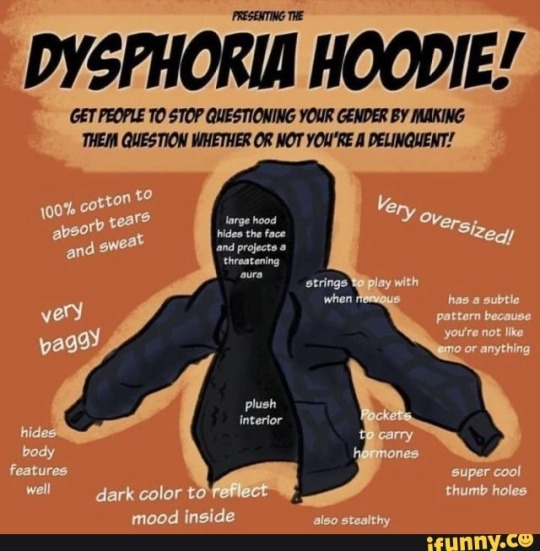
A dysphoria hoodie is a hooded clothing item intended to relieve gender dysphoria by obscuring the shape of a person's body. They're oversized, loose, and usually black or another dark color. Wearing a dysphoria hoodie hides a person's body from others' judging eyes, and allows them to forget about the parts of their body that they don't like.
It's undeniable that Jace's cloak fits this description perfectly.
Jace was extremely attached to his blue cloak. It didn't matter how hot the weather was, or how dirty or damaged his cloak had gotten– he always wore it anyway. And judging by the fact that he canonically had numerous duplicates made, he didn't want to ever stop wearing it. The ability to look and feel mysterious was very comforting to him.
Jace tried to hide his insecurities for as long as he could, but as he grew into adulthood, his problems would grow and change with him.
The novel Agents of Artifice follows Jace's life on Ravnica from ages 19 to 22. Growing up meant the gender role Jace desired to fill evolved from 'boy' to 'man', but Jace had no positive male role models or examples in this formative time.
As Jace's employer and teacher, Tezzeret forced him to use his powers for violence by psychologically abusing him. Tezzeret had an explosive temper and brutally tortured Jace when he failed assignments or hesitated to comply.
Jace's best friend / partner, Kallist Rhoka, showed a sense of entitlement after the two met Liliana Vess. Kallist felt like Liliana owed him attention and sex, despite the fact that she wasn't interested in him because she was already dating Jace.
=========
“You’re a hypocrite, Jace. It’s fine. My own fault, really. I should’ve known better than to take you at your word, when it came to getting something you wanted—the one thing I might’ve found to make this damned place a little better!”
“She was never yours!” Jace shot to his feet, fists clenched. “Never!”
“Because you wouldn’t give us the chance!” Kallist shot back. “It’s not enough that you took away everything I had?”
“Took away … Damn it, Kallist, I saved your life!”
[Agents of Artifice - Ari Marmell]
=========
Kallist wasn't the only man who felt this way. Throughout the book, several complete strangers made it clear that they thought Jace was inferior and undeserving of Liliana's affection, and that Liliana should be with them instead. Other men openly insulted Jace because they didn't see him as a "real man".
=========
“I couldn’t help but notice,” he slurred in a voice heavy with beer, “that you finally sent your scrawny friend packing. That mean you interested in spending some time with a real man?”
[Agents of Artifice - Ari Marmell]
=========
At that point in his life, Jace was still surrounded by men who had very toxic expressions of masculinity, but unlike his teenage self, he had no desire to imitate them. Jace feared and resisted Tezzeret's violent teachings, he disapproved of Kallist's misogyny towards Liliana, and he avoided confrontation with the random strangers who threatened him.
I think Jace's distaste for their attitudes and behaviors shows that his insecurity is truly gender dysphoria and not just toxic masculinity. If Jace disapproved of their toxic masculinity and didn't want to express himself that way, why would he care if he wasn't a "real man" to them? Why did he still feel incomplete as a man? What does being a man mean to Jace Beleren?
Jace wanted to do all the things typically expected of adult men. He wanted to be self-reliant, to be a protector and leader to others. He made himself a protector and financial provider to his romantic partners. He wanted to protect Ravnica and accepted his duty as the Living Guildpact when the role was magically forced upon him. He worked with the Gatewatch to defend other planes and invited them to live in his home. Despite all his efforts, nobody seemed to see that Jace was trying his best.
One of the most common difficulties trans men experience is being infantilized because they're perceived as younger. Trans men often look younger than their cisgender male peers of the same age due to the difference in hormones. Less testosterone means trans men tend to be shorter, less muscular, and have less body hair (not accounting for individual genetic factors).
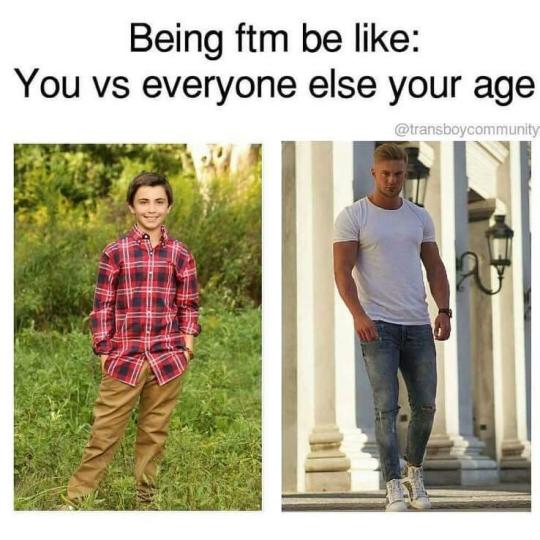
When trans men lack stereotypically masculine physical characteristics, especially those associated with age and maturity, such as facial hair, they don't get treated with the same respect as other men. (For example, adult trans men are often referred to as 'boys' no matter how old they actually are.)
When Jace's appearance is described in stories, his lack of stereotypically masculine physical characteristics is always noted. He's always described as being smaller and less muscular than other men, and it's repeatedly remarked upon that he's unable to grow a beard.
=========
Rulan was clad much like Jace himself, though he preferred deep reds and purples to Jace’s unrelenting blue and black. And unlike Jace, Rulan boasted a full, tidily trimmed beard.
[Agents of Artifice - Ari Marmell]
=========
She cast a critical eye up and down his form. Firm, fit, alert, hair combed. She mentally called bull on it. "You can drop the glamour, dear. No one cares."
He sighed, and shimmered as his illusion dropped. There was the real Jace; paler, hair rumpled, eyes sunken from late nights, and his chin tinted by the adorable peach fuzz that almost counted as a someday-maybe beard.
[Homesick - Chris L'Etoile]
=========
The text shows that Jace experienced infantilization as a trans man. His sparse facial hair is enough to visibly darken his face, but it's referred to as "adorable peach fuzz" rather than a more mature-sounding alternative. In the story Catching Up, Liliana tells Jace that him looking older is "an unambiguous compliment."
=========
"You look older," she said.
"I'm not sure how to take that."
"At your age, dear, it's an unambiguous compliment." She cocked her head. "Have you started combing your hair?"
He smoothed his hair self-consciously, just for a moment, then withdrew his hand. He had, in fact, started combing it. Not that his hair was any of her business. He scowled.
[Catching Up - Kelly Digges]
=========
This aspect of Jace's trans experience caused him to be disrespected in several areas of his adult life. As an adult navigating dating and relationships, people saw him as unattractive and less desirable. As the Living Guildpact, people saw him as unqualified and irresponsible. As a member of the Gatewatch, people saw him as weak and incapable of leadership. Because he was infantilized as a trans man, he was perceived as inherently less masculine, less competent, and less mature. This negative perception reinforced his feelings of inadequacy.
For this reason, Jace was more self-conscious about his appearance as an adult than he'd ever been as a youth. In order for people to treat him with more respect, Jace found it necessary to hide his body with his cloak and to change his appearance with illusions. Jace felt the need to 'pass', and thought being himself was unsatisfactory, especially after he met Gideon.
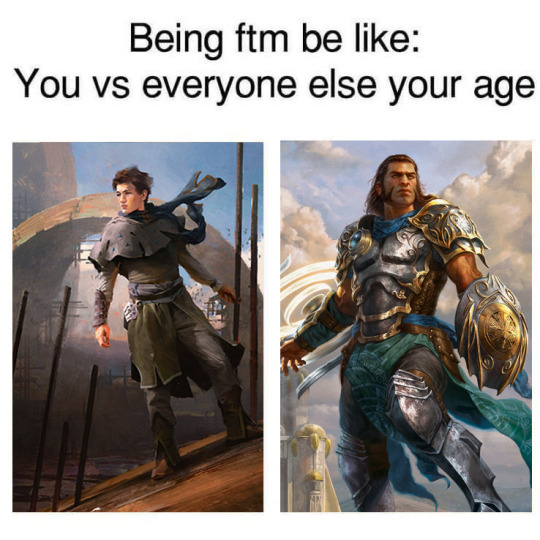
Meeting Gideon was a major turning point in Jace's emotional development as a trans man.
Gideon was a great example of stereotypical but positive masculinity. He was self-reliant but not afraid to ask for help. He was a leader but tried to uplift others. He fought as a defender, not an aggressor.
Jace saw Gideon as an upstanding person and a good friend. For the first time in his life, Jace had a positive male role model to look up to. It made him furious.
=========
"I'd rather stand," said Gideon.
Jace stood up. It was an error. He still had to crane his neck to look Gideon in the eye, and now the size difference between them was glaringly obvious. He hated feeling small. Hated it.
[Catching Up - Kelly Digges]
=========
Gideon made Jace feel hopelessly insecure about himself.
He was everything Jace wanted to be, and seemed to be perfect in all the ways Jace wasn't. Gideon was super tall while Jace was average height. Gideon was athletic and muscular while Jace was thin and out-of-shape. Gideon was charismatic and a natural leader while people tended to automatically distrust Jace.
Jace both admired and envied Gideon. He tried his best to emulate Gideon's positive qualities, but found it difficult because it was clear to himself and others that it didn't come naturally to him. Jace's presence just didn't inspire others or make them feel safe like Gideon's presence did.
=========
What would Gideon say?
Jace smiled. Of course.
"For Zendikar," he said, raising one fist in the air. It felt thin to him, lacking Gideon's armored fist, his baritone war cry, his iron conviction.
[Brink of Extinction - Kelly Digges]
=========
"Vanity?" she said. "That's not like you."
He raked a hand back through his hair, which did nothing to calm its random angles. "I should be at my best for team meetings. Project leadership. Confidence. The idea that I know what the hell I'm doing. And why am I telling you this?" He looked annoyed at himself.
She raised one ivory shoulder in a careless shrug. "Who else knows you well enough to understand?"
[Homesick - Chris L'Etoile]
=========
Seeing the differences between himself and Gideon aggravated his gender dysphoria and reinforced all the manifestations of his insecurity– self-hatred, feelings of inadequacy, and discomfort in his body and physical appearance.
In his time with the Gatewatch, Jace's vision of masculinity had changed to be much more positive, but he was still miserable because he kept measuring his self-worth against an ideal he couldn't seem to reach.
This stage in socially transitioning is emotionally difficult for trans people. It takes time and effort to overcome.
PART 3: CASTAWAY
At age 26, after the Gatewatch's defeat on Amonkhet, Jace involuntarily planeswalked to Ixalan. He awoke on a tropical island with no recollection of who he was or where he came from.
For the second time in his life, Jace had complete amnesia. Just like when he sparked at age 15, his insecurities lingered despite being unable to remember what caused them. He hallucinated illusions of people from his past life, and his subconscious mind projected his insecurities through them.
=========
"You've really done it this time, haven't you?"
This vision appeared whenever the man was struggling at a task.
His shoulders were broad, and his olive skin had a sheen of sweat underneath the shine of his armor. The hallucination was looking over the man's shoulder as he tried to carve a fishing hook.
"Listen, you aren't really suited to this task. Let me handle it." The vision's voice was gruff but friendly.
It came off as condescending.
The man was annoyed.
"I can do it myself."
The hallucination sighed. "You and I both know you're not suited to this. Let me handle it, you go philosophize on the other end of the beach."
"I said I can do it myself." The man let his irritation reach his voice.
"No, you can't. I call the shots and execute, you stand to the side. That's how this works."
The man responded by throwing his hook at the hallucination. It went straight through the figure's eye and landed behind him on the sand.
[Jace, Alone - Alison Luhrs]
=========
An illusion of Gideon represented Jace's frustration due to low confidence in his skills and abilities. No one ever seemed to think Jace was good enough. His intellect, social skills, and physical dexterity were all constantly questioned throughout his entire life. As a result, Jace never got the chance to prove to the people around him what he was truly capable of.
On Useless Island, Jace was utterly alone and could rely only on himself. Jace succeeded in teaching himself to hunt, fish, and build in order to survive. He was not inept at stereotypically masculine tasks, as people had believed him to be. Over time, he grew a thick beard and gained a significant amount of muscle mass.
=========
"You look terrible," purred a voice from above.
The man moved his hands. An illusion of a woman stood above him. She had raven hair, tired eyes, and a disdainful expression. Her arms were gloved in violet satin and crossed in front of her.
"The muscles are a nice change, but you look awful with facial hair." Her lips curled in a disdainful sneer.
The man shook his head, tears building in the corner of his eyes.
"I don't know who you are."
"Of course you don't, boy."
She looked him over. "You didn't know who I was then, and you don't now. Hard to build trust when neither of us trusts each other."
The man decided to stop caring that this illusion wasn't real. He desperately needed someone to talk to.
"Who was I, before here?"
"You weren't who you thought you were, that's for sure. No one else saw through you, but I did. You were never a leader or a detective or a scholar; you were a frightened child playing pretend."
The man swallowed a lump in his throat.
"You can fool the rest of the world with your magic and illusions, but you could never fool me."
The man wanted to sob. Wanted to go back and sleep. Wanted to starve until all of this went away.
[Jace, Alone - Alison Luhrs]
=========
An illusion of Liliana represented Jace's gender dysphoria and impostor syndrome.
Despite everything he had achieved so far on Useless Island, his subconscious mind still held feelings of self-doubt. Part of Jace's mind wondered whether or not he was ever truly suited to being a man, telling himself he "looks terrible" and "awful with facial hair". Again, Jace's maturity and experience are denied when the illusion infantilizes him by calling him a "boy" and "a frightened child playing pretend". This vision was an expression of Jace's fear that he was inherently unfit for masculinity and the roles he wanted to fill as a man.
Unlike the first time Jace had amnesia, though, there were no real people around to reinforce his insecurities. Being alone meant Jace had no one to compare himself to. This gave him the opportunity to truly have faith in himself. Rather than trying to copy someone else's example of masculinity, he was creating his own.
=========
The man opened his eyes, and saw a vision of himself standing on top of the water in front of him.
The image had a blank expression on its face, but was otherwise identical to the man himself, standing calmly—impossibly—on the surface of the water.
The man's jaw fell open in shock.
The illusion appeared solid as flesh, and its detail was astonishingly accurate. The man was amused he did not remember his name but remembered the exact details of his own body: muscles toned, stubble on its face, blistered sunburn on its bare shoulders. He even saw its scars—his scars—the little bookmarks of a life well-lived.
[Jace, Alone - Alison Luhrs]
=========
All the effort he had taken to change himself showed outwardly on his body, and it was very gender-affirming. He was happy to see his muscles and facial hair and sunburn. I don't know how else to say this, but Jace being proud of "his scars" just has super transgender connotations. When Jace saw his scars, he appreciated them as proof of his ability to change and adapt– proof of his survival.
One of the most meaningful and symbolic moments in Jace's story is his decision to leave Useless Island. He built a raft and sailed away, uncertain of his future but determined and unafraid. Among the items he packed for his journey was his old blue cloak, unaware of the meaning it previously held for him. Jace encountered a storm soon after leaving, and all the items he brought with him were lost or destroyed, including his cloak. But he wasn't upset. He didn't miss it. To the Jace of Useless Island, it was nothing more than a piece of fabric. The Jace of Useless Island was comfortable in his body, and had no need for a dysphoria hoodie to hide from himself or anyone else. By letting his cloak be destroyed, Jace let go of his insecurities.

Vraska found Jace washed up on a rocky island and accepted him into her pirate crew. Jace was eager to help, using his tinkering ability to fix telescopes and compasses. He also used his illusion magic to make The Belligerent invisible during a raid, and even fought vampires with the crew.
People need to have loved ones in their lives who make them feel accepted and respected. It's absolutely critical for a person's emotional health, and especially for trans people, whose close support networks are often insufficiently small or entirely absent. When you feel ashamed of yourself because you're constantly being criticized, when you live in fear of the world around you because you're hated, it's difficult even to simply exist. Having just one person who truly makes you feel safe makes a world of difference.
This is why it was so important that Vraska, the only person on Ixalan who knew Jace before his amnesia, didn't judge him based on his past. She didn't try to tell Jace who he used to be or who he should be. The crew of The Belligerent allowed Jace to be himself, and they cared about the qualities he had, not the ones he lacked. This key difference in how people treated Jace on Ixalan is what allowed him to thrive.
In The Flood, Jace fell down a waterfall and hit his head on a rock. The injury triggered a reversal of his amnesia. After Jace got his memories back, he reflected on the difference between his past and present selves.
=========
"I wouldn't have had the strength to climb this a year ago," Jace said with a little bit of pride. "Or if I did, I probably would have passed out halfway up."
"You weren't that out of shape when I last saw you," Vraska teased.
"You're ignoring how often I used to use illusions to make myself look like I was in shape."
Her brows shot up. "Seriously?"
"Oh yeah," Jace acknowledged. His expression was unguarded, eyes still red from emotion, a lighthearted tilt to his lips. Unapologetically human. He grinned. "I used to be a coward."
He let Not anymore hang unspoken in the air between them, and Vraska caught his smile as he turned to ascend the golden staircase toward Orazca, one strong step after another.
[The Flood - Alison Luhrs]
=========
The old Jace was always being compared to others. That Jace hated himself because he could only see himself as an inferior version of other men. He wanted to hide because he felt like he would never be enough. He wanted to be anyone but Jace.
The new Jace unlearned that mindset. He realized the only 'right' way to be a man was to try to be the best Jace he could be. Having room to improve meant he had the opportunity to find joy in growing and changing. He was proud of himself for taking control of his identity and putting in all the effort necessary to transition. On Ixalan, Jace cultivated the strongest body he ever had. That new body made him braver and more confident than ever before. And that new confidence made him happier than he'd ever felt in his entire life.
The resolution of Jace's arc came from his transition. All his life, Jace had wanted people to understand and accept his true self. For people to see his true self, he needed to be able to show them. Jace was able to start healing from his trauma on Ixalan because for the first time in his life, he felt like it was safe and good to be himself, so he lost his fear of judgment and embarrassment. Through that acceptance, he learned to be himself, and to love himself, and to love his transness. On Ixalan, Jace finally became the man he wanted to be.
=========
Jace looked down at himself.
The tan was real. The scrapes, the newly callused hands, the muscles (the muscles!) were all his. Jace felt proud of his body for the first time in his life. He must not lose track of it now.
[Wool Over the Eyes - Alison Luhrs]
=========
PART 4: DEEP BLUE
Jace being a transgender man is not just a headcanon to me. It's a textual interpretation that I believe adds meaning to the story and enriches Jace as a character.
My interpretation of Jace as a trans man is rooted in the way his personal philosophy guides him as a Blue character.
Blue's central theme is "Perfection through knowledge." Blue sees the world and everything in it as a blank slate waiting to be transformed. With the right knowledge, all possibilities can become reality. Jace's expression of "Perfection through knowledge" is his journey to become a better person by understanding himself.
=========
Jace chose his words carefully.
"Existence is adaptation to changing circumstances. The self is an accumulation of what one has learned from those changing circumstances . . . Our agency gives us the means to alter our own path. You are who you decide to be. And who you will become depends only on how you choose to adapt."
[Something Else Entirely - Alison Luhrs]
=========
Jace's personal philosophy as a Blue character is "You are who you choose to be''. He believes that people are defined by the choices they make with their free will, and rejects the idea that the self has immutable qualities. To Jace, there is no pre-determined path or destiny for him to follow. Rather, he continually seeks to cultivate his own identity through change.
In my interpretation of Jace as a trans man, Jace holds these beliefs because they're lessons he's had to learn in order to overcome his struggles and accept himself.
As a Blue character, Jace's core struggle is his desire to understand himself. Jace's life has been a constant quest to figure out who he is. Above all, Jace's thirst for knowledge is a need to understand his potential and his place in the Multiverse.
=========
Jace.
My name is Jace Beleren.
So there was something in there, waiting for him to dig it out.
And who is Jace Beleren? Is he a good man? Is he kind?
He willed away the shape and sat, alone, farther from home than he’d even known was possible.
He’d have to wait and see.
[Jace's Origin: Absent Minds - Kelly Digges]
=========
Having lost so much of his life to amnesia, Jace has often been unsure of who he is or who he should be.
I've always seen the divide in Jace's life caused by his amnesia as a parallel to the 'before' and 'after' periods in my life as a trans person.
When I decided to start openly living as a trans boy in high school, it was like I was being haunted by my own ghost. I didn't know who I was or how to act anymore because everyone around me seemed to see and speak to a version of myself that no longer existed. But I hadn't died, I was just different. I wanted people to see that I was alive and well. I wanted to make myself feel real again.
Like Jace, I was a teenage boy with no past. I needed to rebuild myself, and I had to start from scratch. I wasn't sure what to do with myself, but the one thing I was sure of was that I couldn't look back. I didn't want to. And neither did Jace.
Jace is known for his love of investigation, puzzles, and research, but his past seems to be the one thing he's not curious about. While he does occasionally wonder what his life used to be like, he's never shown a desire to return to that past. He's never put any time or energy into re-discovering old memories or trying to restore some previous state.
When Jace asks himself, "Who am I?", he's not asking who he was before. He's asking who he can be. What matters to Jace is not who you were, but who you can become.
The past is unimportant to Jace, and this belief gives him strength. He expressed this on Ixalan when he vowed the illusions of his past would no longer bother him.
=========
"No more involuntary illusions!" he said, and something in the back of his mind rung with magical affirmation. It would not happen again.
He had control over his mind. He was the wielder of his talents.
[...]
Then a thought occurred to the man.
"Who I was doesn't matter . . . because I get to learn who I am now."
Saying it out loud made it feel real.
"Whoever I was is irrelevant, for I will become whoever I want to become."
He believed that with all his heart.
The man realized what he must do.
He was going to prove to himself that he deserved to live.
The man got to work.
[Jace, Alone - Alison Luhrs]
=========
Jace understood that in order to progress, he had to keep moving forward. Letting go of the past is what allowed Jace to live in the present and to have hope for his future.
This aspect of Jace's philosophy is also an important aspect of trans acceptance. Many trans people struggle with making the decision to transition because they fear it's too late. They may feel that way because of their age, because of their circumstances in life, or because other people will remember them differently. But Jace believes that the person you were yesterday doesn't have to be the person you are today, or will be tomorrow. When you understand this, you understand that it is never too late for anyone to change.
It's in our nature as thinking, feeling beings to want to explore and discover new things about ourselves, but transphobes want us to repress our curiosity. My whole life, I've had to fight back against people who disrespect my identity and want me to submit to their idea of who I should be. Jace shares this experience.
=========
Baan regarded him coolly. "You were bullied as a child."
Jace coughed on his first mouthful of food and struggled to swallow. "I, uh, don't remember my childhood." A dozen unvoiced thoughts flickered behind his eyes.
The Kaladeshi raised his brows. "One need not consciously recollect an event to fall into habitual behaviors determined by the experience. It is not inconceivable that one could forget their entire life. I would safely wager that were that the case, the subject would still tend to make similar lapses of judgement, and would be drawn to associate with the same sorts of people." He waved a hand, the swish of an ox's tail dismissing flies. "The nature of mortals is not so malleable as some would naively suppose. A person of religious inclination will always find something greater than themselves to place their faith in. A criminal will forever remain a criminal."
Jace put his fork down. "That's a very...deterministic point of view, Minister."
[Homesick - Chris L'Etoile]
=========
Dovin Baan expressed beliefs about identity and human nature similar to those of the transphobes I've dealt with. People like them think, "You were born a certain way and you will always be that way. You will never be anything else. No matter what you do, you can never truly change."
But Jace lives in defiance of that idea. Jace knows he's capable of change because he actively chose to become someone new. What he once was, he no longer is. Jace's disagreement with Dovin Baan isn't just a difference in opinion; it's a defense of his existence. When transphobes deny our identities, they deny our reality.
If Dovin believes our identities are set in stone, Jace believes we each hold a sculptor's tools. Whether or not you will change is your choice. But you alone have the power to make that choice, and no one can take that away from you.
=========
She sighed. "I don't know how the Golgari will see me when I return."
Jace shrugged. "You get to decide how they see you."
She looked at him with uncertainty. Jace continued. "How we engage with the world is dependent on how we present ourselves to it. We are continuously adjusting to change because if we fail to change, we fail to survive. By nature of you surviving the hell you did, you have changed into someone wiser than before. By nature of you commanding this ship, you've transformed yourself into the leader you always knew you could be.
"What makes you you isn't your circumstance or your past, but the choices you make in the future. Your ability to learn and adapt is what makes you who you are today, and that is what dictates who you will continue to become."
[Something Else Entirely - Alison Luhrs]
=========
Jace's focus on adaptation and self-improvement reminds me of the theory of gender euphoria; the idea that gender identity is defined by positive feelings and what feels right to a person, not negative feelings and what feels wrong (gender dysphoria). You can't be happy if you only focus on things that cause you discomfort and pain. You need to find things that give you comfort and bring joy to your life.
As a teenager, Jace hated himself for his weakness. He felt like being tough would make him more masculine. But when he grew up and gained more life experience and new role models, he realized that was no longer what he wanted. It may take some time to figure out what you want, and you may even find that what you want will change, but the end goal will always be to become the best version of you.
This process of trial-and-error is integral to Jace's philosophy.
We ourselves must constantly change in order to survive in an ever-changing world. Jace believes we are defined by the lessons we choose to absorb from these experiences. Every time you change, you have the opportunity to learn something new about yourself. You have the opportunity to see how you've become stronger and see what inspires you to live. That is adaptation. That is growth.
Even if you feel like you're not where you want to be yet, in Jace's eyes, you have already proven your identity just by choosing to walk that path. You can't just wish to love yourself. You have to choose to see yourself as someone worthy of love.
Jace wants us to see and appreciate ourselves for who we are and who we want to be, not what we aren't. You're a glass half full, not a glass half empty. Your potential is infinite, not wasted. If you learn to see yourself this way, it's easier to be a happier, more authentic self.
Jace's philosophy is what makes his character development a beautifully resonant trans story worthy of being true trans representation in my eyes.
=========
In that moment, Jace noticed a change within himself. The Jace of Zendikar and Innistrad and Ravnica had a nervous energy about him, persistently bored and disastrously introspective, constantly aware of the chasm of absent memory that was always on his mind's horizon. The Jace without a past was present, alert, comfortable no matter the circumstance and ready to face whatever might come his way. He remembered what it was like to be both, but recognized how much more natural it was to be the latter. In the span of a moment, Jace was surprised at himself, and then realized his earnestness of late, of Ixalan, was not manufactured, nor was his mindfulness something he could only access in a state of amnesia. That was who he had always been. He had just forgotten.
[Glimpse the Far Side of the Sun - Alison Luhrs]
=========
PART 5: REPRESENTATION FOR TRANS MEN IN MAGIC
If that all seems like an excessive amount of explaining for why I believe Jace is trans, that's because it is.
My interpretation of Jace as a trans man means so much to me because there is no actual representation for trans men in Magic. Which is, frankly, really wack.
In 2015, Magic's first ever transgender character, a trans woman named Alesha, was introduced in the beloved Khans of Tarkir story, "The Truth of Names."
In 2018, a nonbinary elf Legend named Hallar was printed in Dominaria.
In 2020, a nonbinary human Legend named Alharu was printed in Commander Legends.
The introduction of trans characters in Magic really ramped up in 2021. Kaldheim introduced an angel who uses Xe/Xer pronouns in the story Know Which Way the Wind Blows; as well as Niko Aris, Magic's first nonbinary Planeswalker. Strixhaven introduced Dean Nassari of Prismari College, a nonbinary efreet Legend. And Strixhaven: A Curriculum of Chaos, the set's accompanying Dungeons & Dragons book, introduced a nonbinary loxodon NPC named Bhedum 'Rampart' Soovij, and a human NPC named Nora Ann Wu, a transgender girl who counsels other transgender students at Strixhaven. The Innistrad: Midnight Hunt story His Eyes, All of Them featured an elderly transgender woman named Malynn.
Early 2022 saw the printing of another nonbinary character, an elf chef named Rocco, in Streets of New Capenna. And a nonbinary soldier named Myrel was printed in The Brothers' War.
Seven years after the introduction of Alesha, Magic acknowledged that trans men exist for the first time ever in May 2022, when the 'Pride Across the Multiverse' Secret Lair Drop was announced, just a few days after I began writing this article.
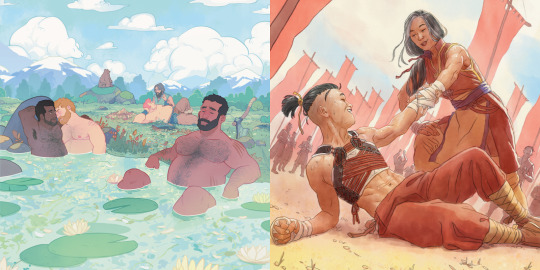
This Secret Lair Drop had eight cards featuring art, all by LGBTQ+ artists, that showcase the strength of the LGBTQ+ community in the Magic Multiverse. This celebration of diversity was beautiful, heartwarming, and inspiring in its entirety. Notably, it also featured two trans men in its art. In the new art for "Bearscape'', one of the men is depicted with scars from top surgery (gender-affirming surgery to flatten his chest). And in the new art for "Alesha, Who Smiles at Death", Alesha reaches out to support a young transgender man wearing a chest binder.
As a transgender man myself, I'd been waiting forever to see representation for trans men in Magic. I was happy… and then I wasn't. Two nameless transgender men with no lore appearing in the art for a Secret Lair Drop is just not meaningful representation.
The first named trans man to ever appear on a Magic card was Klement, a tiefling introduced in the summer 2022 set, Alchemy Horizons: Baldur's Gate. Don't get me wrong, I like Klement a lot– he's a very cute character and I'm glad he exists. But it's frustrating that he doesn't even exist in the Magic Multiverse because he's a Baldur's Gate character, and you can't actually own a real Klement card because he's a digital Alchemy card exclusive to Magic Arena.
Now that we're in early 2023, Magic is set to have been around for 30 years without ever featuring a named trans man character on a printed card or in a story.
Trans men have remained painfully invisible in popular media, even as the mainstream has gotten a lot better about representing a wide variety of people in the past few years. Magic in particular has done a very good job of increasing representation for marginalized groups. Magic clearly isn't afraid of including trans characters, which is why the lack of representation for trans men is so disappointing and so baffling to me.
Not having any representation for trans men in Magic hurts because meaningful representation for marginalized groups helps tremendously to promote inclusion in the community. Magic has a wonderful community and I feel like its members genuinely try to welcome all kinds of people, but others can't learn to become more accepting of you if they don't even know you exist.
When people talk about making the community welcoming for people of marginalized genders, trans men are often forgotten and left out of the conversation. When I see people discussing matters of marginalized genders in the community, they don't acknowledge that trans men are just as affected by gender discrimination as other marginalized genders. And I often see people (even other trans people) use the phrase "women and nonbinary" when talking about creating safe community spaces, seemingly not realizing that phrase categorically excludes trans men.
If the intention is to be inclusive, I don't know why we'd be excluded. It hurts to think that people say these things because they either don't know we exist or actually don't want to be friends with us.
I'm genuinely glad I've seen so many other trans people and allies connect with each other through the Magic fandom. But it's sad to not feel that same sense of solidarity and friendship. When I talk with other trans men in the Magic fandom, we're often lamenting the fact that there are no canon characters or prominent Magic creators / community members who are trans men. We have nothing to celebrate.
I think Magic's story and characters should reflect its diverse fanbase. The trans men in the Magic community deserve to have our stories told. Not only so others will understand our struggles, but so they can learn to share our joy. I want to show others who I am, and that I'm happy to be me.
Jace's character shows that people are receptive to these stories, and that in some cases, we have secretly been there all along. I'm just hoping for the day we can step proudly into the spotlight.
2K notes
·
View notes
Text
Let's chat
So, the Winnower. Right?
Today, they finally released the lore on one of the ships that you got if you purchased (pre-ordered?) the annual pass. The ship is called Nacre. As usual with names of things in Destiny, this means something, though I'm currently unsure about the significance of this name in relation to the text of the lore tab.
But the text of this lore tab will cause a billion discussions and people will fervently believe in one side or the other. You'll understand why the moment you start reading the lore tab (I'll go through it a bit later in the text) if you remember the style of Unveiling. It's written in the same style with many references to Unveiling and the author speaks to us post-Witness' defeat (most likely).
I think it's intended to make us discuss and argue, given the inherent unreliability and religiosity of the subject.
But let's go back a little bit. Why the Winnower? Well, the word "Winnower" was finally mentioned in-game by the Witness. When you finish the second encounter in the Salvation's Edge raid, you proceed towards the third, and at one point the Witness will speak (it speaks a lot during the raid):
The rest of the post below:





Many people, upon hearing this, have jumped to the conclusion that the "Winnower" is now confirmed as a real thing; including Byf who made a video about it and now everyone and their grandma believes this fully and is already constructing fanfics about the next big bad.
And it could be true! But to claim that this line specifically confirms the Winnower makes me question people's media literacy. This line is spoken by the Witness. The Witness has both the reason to lie to us, but also the reason to believe in the Winnower. This is unreliable narration 101: the Witness could believe that it serves something else, that the reason it destroyed its own and many other civilisations is because it is following something greater. Obviously the Witness would believe that it's "the first knife" of some godly entity. It's religion. The word of a religious person who believes in a deity is not the proof that the deity exists.
This does not mean that the Winnower is NOT real. We don't know if it is. This only means that we can't use this specific source as proof.
But this line is very interesting to me because of how it's phrased. Initially, I believed that the Witness spoke to us, the Guardians, because that's what it does throughout the raid. But after a few reads, this feels like it's at least partially aimed at the Traveler as well. The third line in particular is interesting: "Each child we save from the game, you again force to play." This feels like it's talking about the Traveler's growing/resurrecting powers, especially about how it resurrected Guardians. We were dead, but then we were forced to play again. It's also speaking about it like the "game" which can be a sort of 4th wall-breaking, but also it could clearly be referring to Unveiling which also calls it playing a game.
The last line is also interesting in this context: "Gods forged us both." Who is "us"? Obviously the Witness considers itself here, but which "gods" forged what else? Does the Witness consider the Traveler to be a god, forging the Guardians? The next line is also weird in this context, telling us that despite gods forging us, "they cannot tell the knife what shape to carve." Either the Witness still doesn't understand the Traveler or the Traveler is not considered as the god because that's the Traveler's whole philosophy: it creates things, but it doesn't tell those things what to do. It would never tell us what shape to carve. So if this is not referring to the Traveler forging Guardians, it might be referring to something else forging the Traveler. Possibly! I am very intrigued by these lines and the line of thinking the Witness uses here.
But let's go back to the Winnower. As I already said, this doesn't prove anything, it only proves that the Witness believes in it. We also know that the Witness believes in this because in the final mission it also told us that it is "the first knife, the edge that carved purpose into being." Later, after its defeat, Mara and Ikora discussed this phrase, which I covered in this post. This discussion also entertained the possibility that there's something else beyond the Witness, something that wielded it as a "knife." Mara and Ikora don't make any conclusions; they discuss the possibility, but they end it with "we don't know."
They discuss it in the context of Unveiling; this lore book is canonically available to read to characters in the game, which is neat! It's been discussed several times now in the lore, and it's discussed here as well. Mara and Ikora have read Unveiling, it's where they've read about "the first knife" concept and are wondering what it all means and if there's a way to figure out the truth in the allegories. Again, they don't know the answer. And neither do we!
However, we as players have more information than the characters. I'm pretty sure the delay on the lore for Nacre was on purpose, because it would've been confusing to read that before defeating the Witness. The lore tab itself has no clear author; the only way to tell is to speculate based on the style and phrases used. The style will immediately be reminiscent of Unveiling (and the one page in Books of Sorrow when something speaks to Oryx). It's casual and friendly, but persuasive.
Let's read it piece by piece:
Let's chat, shall we? One more nice sit-down for the books. Did you think you wouldn't hear from me again, after all this? You'd have missed me, I hope—and I would certainly have missed you. Have no fear. I'm not so easy to be rid of. Now, let me show you: my beloved. Oh, no, not my sedimentary necrolite, fossilized in time. You've seen that. I speak of that dear and distant expanse of the universe, miraculous in its fullness and its emptiness all at once. Are you surprised to hear of it? Yes, I never much cared for the change of rules, but here we are, and there's no use in crying over spilled radiolaria. Besides, at the heart of it all, there was a gift. To me. That gift is the chance to speak with you. You, and a billion like you.
A few points right away. It's telling us that we should chat and that it hopes we didn't think we'd never hear from it again. If this is truthful and can be trusted, then it would be alluding to it speaking to us before, in Unveiling. But we've gone over the debate about Unveiling and who wrote it; most recent information was that it has to have been the Witness and the characters in-game believe so as well. So what's the truth now? I don't know! That's a full sentence. We simply don't know. There are far too many variables, allegories, metaphors and unreliable (and completely unknown) narrators.
Both options could also be true at the same time; if the Witness somehow managed to get a glimpse of the Winnower (in whatever form this entity exists), perhaps the Witness was given a speech of this nature which it could've adopted on purpose to further spread propaganda to others and to convince itself (and others) that it is a part of something greater. Again, we simply don't know.
The author continues telling us that it wants to show us its "beloved." It then goes into a bizarre description of something as "sedimentary necrolite, fossilised in time." I am not sure what this refers to, but it could be referring to the Witness? Because we've "seen that." A "necrolite" is an old term for a type of stinky minerals that form rocks which might be referring to the Witness' obsession to calcify and preserve things as they are; therefore, "fossilised in time." It could also mean something else. Really strange!
Either way, the author does not refer to that, whatever it is, it refers to the universe as a whole. The universe is its beloved. Then it continues and draws back from Unveiling directly. It tells us that it "never much cared for the change of the rules," the rules being the rules of the flower game and the change being the one the Gardener put in the game. It even jokes with "no use in crying over spilled radiolaria," a reference to the fact that previously, the winners of the game were always the Vex.
The interesting bit here is that, if the author was indeed talking about its disregard for the Witness, then the Witness claiming to be "the first knife" the Winnower wielded is not true. If this author is the Winnower, it does not really care about the Witness or its view of the final shape. Hell, the line about Winnower discovering the first knife in Unveiling would then not refer to the Witness at all, but despite that, the Witness believed itself to be that knife. This is why we can't use the Witness' words as any sort of proof, but also we can't use this narrator's words either.
To go back to the change in the rules, another intriguing thing is, in Unveiling, the Winnower appeared to be angry about the change. It's what made it "discover the first knife" and begin the fight with the Gardener. But here, it claims it didn't care about it after all.
I believe this is important to understand that what we're dealing here is not a clear cut truthful chat with a friend. The author of this text, and the author of Unveiling, does not have to tell us the truth and we simply have no clue which one of these statements is truth, if any. Or, it simply changed its mind; perhaps it was angry back then, but now it no longer is, because it realised that the change in rules gave it the ability to speak to us, something it appears to value greatly. And "us" does not just refer to us as Guardians or even humanity, it appears to be referring to all living creatures in the universe. It continues:
I am making this offer over and over again, in every tiniest cell and the vastest of civilizations. Let me in. Take what you need. Be at ease. You have no say in the degradation of your telomeres, but in all the interim, the whole world is your sweet silicate shellfish. You exist because you have been more suited to it than all the others. Steal what you require from another rather than spend the hours to build it yourself. Break foolish rules—why would you love regulation? It serves you to cross lines, and if others needed rules to protect them, then they were not after all worthy of that existence.
This also seems to be a continuation of its philosophy in Unveiling. About taking and breaking and destroying and whether or not someone is worthy of existence.
Caricatures of villainy are out of style, I hear. Yes. I am no cackling mastermind: I am serious when I say this. It was not the trick of standing upright that lifted you from the dust: it was the mastery of fire, the cooking of cold corpse-meat. That is not any unique faction's province, neither good nor evil. It is simply truth.
And this as well, continues with its claims that it is, essentially, neutral. It is not a villain, it's merely stating the truth that sometimes destructive forces can be good. This can also have a second meaning, telling us that it will not be our villain in the game. As in, we will not be fighting against this entity because it's not something that can be fought in the first place, nor does it care to fight. The final paragraph adds:
This great, beloved cosmos. Always decaying, always finding that same old lovely pattern, despite every candle-flame burning amid the flowers. A billion electrons taking the path of least resistance. In Darkness or in Light, someone is always making my choice. Be seeing you.
Some more references to Unveiling with "same old lovely pattern" and stuff about flowers. And then it ends with telling us that Darkness and Light don't really matter because either way "someone is always making my choice." We can assume this means the choice to violence. And that's true; Darkness and Light, as we've learned, are not moral forces. Many atrocities were committed by Lightbearers, and Darkness users have, throughout the universe, been benevolent.
The author concludes telling us that it will be seeing us.
What does it all mean? We don't know!
I think a lot of people will take this literally; this is the proof of the Winnower, this is the proof that it is preparing to be the next big bad, that we will see it eventually, etc.
I'm personally not sure if the literal reading makes sense, primarily because we have no way to verify anything it said or who sent it and how. But also, if we accept that it is written in the style of Unveiling (which seems fairly obvious), then we also have to accept that it's not entirely reliable or fully truthful. As in, there's a lot of metaphors and philosophy here, rather than facts. Some of it could be facts, but we can't tell which those are.
I also think a lot of people will immediately conclude that this proves the Winnower as a real entity that exists somewhere that will be relevant going forward. Personally, I don't know. I'm not inclined to believe either option just yet. If we knew more about the source of this (and I'm not taking into account the Witness' beliefs), then it would be easier to discuss it, but for me this is just something that remains a mystery for now, in the same way a religion would be. This is what makes it interesting to me.
A reading I'm partial to is that this is a really neat conclusion on that chapter of the story without telling us too many details and facts about a text that, genuinely, reads better if it remains unexplained. There's... something... out there. We can call it the Winnower for simplicity. But this entity is not some sort of big bad physical being that's scheming behind the scenes and directing its pieces around; it does not care. It did not care about the Witness and its final shape, despite the Witness believing, potentialy, that it is enacting exactly what the Winnower wanted, calling itself its "first knife."
This entity is not the way the Witness imagined it or believed in it. This entity does not need to involve itself or even be physical; its adherents are everywhere in the universe, all the time, because "someone is always making my choice." No matter where we go in the universe and how much we explore it, we will eventually find those that choose this. It cannot be removed or defeated. We defeated the Witness, yes, but someone else can always rise up to do something similar. The fight is never done and it's not tied to simply Light and Dark. Our choice is not over because we won here; we could always choose differently in the future.
It honestly feels like a setup for us going forward, but not for us meeting the Winnower or fighting it; instead, to tell us that if we plan on exploring more of the "beloved" universe, we will always find those we disagree with, those to fight, those who made the other choice. And if we're not careful, we may end up making that choice too. Whatever that entity is, the universe is making its argument for it and it will never truly be defeated. It can't be!
The Witness wanted to end the game. This entity states that the game has to play itself out.
Or it could mean something completely different. I'm not going to claim anything one way or the other and I think it's genuinely really baffling that anyone would try to do so. We all have our preferences for the story, but I don't think any of them are sufficiently backed up and I'm not going to hype myself up for a scenario that will probably never happen. Or we'll be hearing about "bad writing" and "retcons" in a few years time when the Winnower never shows up (or if it does).
The point is that this is a very intriguing piece of lore that fits perfectly with the mystery and religiosity of Unveiling. It's not some huge epic reveal, though it could always be something more in the future. However, we would have to get a lot more information to be able to make that conclusion. Something spoke to us in this lore tab, but we have no way of knowing who or how or why exactly now. We have no way to verify it either; is the author legitimate or is this a scheme from someone else pretending to be it? And even if the author is legitimately some other entity, is it truthful? Can we trust it? Should we? Does it even matter? Is this information important for us to understand our enemies or is this just insight into the philosophy and metaphysics of the setting?
Is the Winnower real? We don't know.
Is Unveiling still an allegorical mystery with some truths that we can't really tell apart from the metaphors? Pretty much yeah.
Is there going to be a lot to discuss about this going forward? Absolutely. It's why I wanted to write about it immediately because it's fascinating and I can't wait to see all the ways people will interpret it. I highly recommend that everyone reads it themselves and compare to Unveiling (and the last two pages of Inspiral).
I just don't want people to subscribe too hard to a single narrative and then get incredibly disappointed if it doesn't happen. There is not a single narrative being promised by this lore tab and we have no confirmed facts. But I'm super excited to see where this goes in the following years. Even if it goes "nowhere" as in this does not end up being setup for some big antagonist 5 years from now, I find it incredible that this was part of the setting. Weird space religions and bizarre entities from beyond the universe are some of my favourite parts of scifi so this whole thing, no matter how it ends, is a 10/10 story for me.
#destiny 2#witness#winnower#the final shape#lore vibing#long post#i'd be happy to hear everyone's take on this#i'm fully in the 'we don't know shit' camp and i'll be excited to learn more (if we ever do). either way#but yeah. don't latch onto a single interpretation. i sincerely doubt it's meant to be read to find one fact about the whole thing#if there's any facts at all#i know most gamers will just ignore the whole beauty of it being a puzzling piece of philosophy and instead...#...immediately start fantasising about a bigger and better evil villain. despite the fact that this entity literally says it won't be that#but then again. can we trust anything it said? does it matter?#anyway. have fun losing your mind about it!
110 notes
·
View notes
Note
Sorry if you answered this, I did go through your asks a bit but didn't find an answer and I was just curious if you have any lore regarding the drow and Orin? Does he have, like, any thoughts regarding her as a pseudo-sister or she is just a henchmen that stabbed him in the back? Or like, regarding the fact it was her betrayal that got him out from the cult and eventually meeting Astarion and the gang? I feel a lot of people sanitize the Durge a little too much (which fair reaction, they are very fucked up in the game 😂) so I love hearing about people who have their durge lean on their violent weirdness
Huh! I guess it's been a minute since we've talked about Orin. Yes, their relationship was very significant and you should be able to find all that I've written and drawn with/about her here (save for anything I forgot to tag, which happens sometimes, lol.)
Also as a side note to everyone, please abstain from making comments about how other people choose to write their Durges (and Astarion for that matter) in my askbox, it is rarely (If ever) necessary.
Anyways, I guess this is a good opportunity to try and put it all down cohesively, so here we go:
DU drow came into the Bhaal temple at ages 17-19, he had lived a profoundly isolated life up until that point where his only constant companion would have been the lackey Sceleritas and, for a time, a horse. He had no friends, no companions, and killed the one woman he lost his virginity to the day after he met her. Sarevok and the rest of the Bhaalists taking him might have been a mockery of a family unit, but it was the closest he ever had to it nonetheless - and by far the one person in it that he felt the closest to was Orin, who was close to him in age and in that moment in time occupied a similar place in the temple's hierarchy as himself.
It's important to note here that when I say they were close, I'm talking about a closeness befitting of Bhaalspawn. They didn't share any good times; they had bad times together. And they enjoyed it to the extent that two profoundly dysfunctional young adults groomed to become murderous deities can. There was no tenderness here, feeling was expressed through violence and vulnerability wasn't only discouraged, it straight up wasn't practiced or even conceptualized in either of their heads. They killed together, mocked one-another, and hurt each other on the regular, and it's through those actions that they saw each other.
And yet, DU drow felt a burning limerence towards her from the moment he laid eyes on Orin, and this feeling never faltered, only grew. Orin cut off his matted hair in a careless, uneven slice of a blade, she pulled out his rotting molars with rusty pliers, she mocked his stink and resented his arrival (dare I say she was afraid, because she knew what it meant) but they had much more in common than they had in difference. This was a silent understanding, a screaming fact of life that led to them often gravitating towards each other in both packed and empty rooms, but never once discussed aloud.
I have no doubt that what would eventually become this Rabid, burning crush and later obsession of the drow's towards Orin is a result of their continous Isolation. The rest of the world was beneath them and temporary, and above was only Sarevok and Bhaal. Because of this, DU drow never once thought or desired to search for companionship and love anywhere besides for her, and so he started to see her not only as the vague concept of a sister, but also as his only option for a mate and wife, one which he embraced wholeheartedly (and that's putting it lightly).
Orin, on the other hand, had no such desires. Not to mention that her fear of being replaced and the implied consequences of it always spoke louder than any genuine feelings of comradery.
As DU drow ascended in the ranks and became head of the cult, those fears solidified in several ways. Not only did Sarevok favor him and she could feel herself being pushed aside, but DU drow's ego grew tenfold. What was once a quiet young man who saw himself as an equal to her became a self-righteous bhaalspawn who lavished in his role and all the boons that came with it. DU drow took everything he had acquired for granted, including her, whom he assumed would eventually succumb and become his romantic partner.
It didn't help that Sarevok subtly encouraged this partnership, thinking that through their children they could continue to produce bhaalspawn of a purer and more efficient pedigree.
Ironically, DU drow's disillusions went so far that he never once in his life thought Orin would turn against him, and as much of an egomaniac as he became, his love for her was always genuine - misguided, but genuine, and he never once wished for her death until she betrayed him. Realizing this, as well as that Bhaal would only accept one chosen, she struck, putting the tadpole in his head and sending him off to Kressa.
105 notes
·
View notes
Note
OMG!!!! Ok ok ok ok ok- hear me out. We all know Sage DESPISES Wild, right? Now… imagine, a reader who prefers Wild over Sage. Everyone knows about it. I wonder how our little angsty boy will take that knowledge… and Hylia forbid if reader prefers Cal over Sage… He hates him even more.
Discuss.
This is SO funny because my wonderful Significant other (@wayfayrr ) actually prefers Wild while I prefer Sage.
It's funny because...here's the thing. Sage has such an interesting ego in the sense that this will go one of two ways. One) He either won't care. Depending on his stance with Reader? He won't give a shit. He has his own things to do and he doesn't care if reader wants to waste their time on someone who looks like they picked a fight with the road and lost.
But if he does like reader? It eats away at him. It absolutely just picks and picks and picks and he's livid. He's doing everything he can to destroy that relationship. Little whispers in reader's ears, maybe he's taking something of their's and putting it wild's bag, maybe he's picking a fight only to act innocent once Reader appears. Hard to say, the point is, he's doing everything in his power to destroy that little relationship before it even has a chance to blossom.
Should Cal be the object of affection it might be a lil different. Because Cal, for all intents and purposes, is like...as close to lore accurate link as possible. Like in AOC he's an absolute BEAST. So he's a pretty even matchup for Sage in that way. However, he has the emotional capacity of the rock he ate for lunch so that might put a damper on things.
Or does it?
Because imagine, if you will, a reader who teaches Cal how to love and how to cherish and how to have emotions further than hungry indifference. Then Cal forms that bond. That bond that he's aching over, craving for. he thinks about it 25/8 and is following three steps behind reader at any given time. Because then? Then should he and Sage have to face off?
Then you have something far bigger and far more...intricate in my opinion. A fun concept! I'll toy around with it a bit more and see if i come up with anything <3
#cinder rambles#linked universe x reader#yandere linked universe x reader#linked universe#yandere linked universe#link x reader
151 notes
·
View notes
Text
Things I'd want for an an "Ever After High" reboot

As much love as "Monster High" has gotten--and as much attention as it's gotten, thanks to 2 reboots--I think it's time for a reboot of Ever After High, for the lore/show if nothing else (and yes, I know it was all for the dolls). And note: I say "reboot" instead of "revival" because the show had a gaping flaw with it, and I'll include it in one of the things I'd like to see in a Gen 2 of EAH:

More nuance--The BIGGEST issue with the show was how biased it was when it was trying to see itself as a complex story. The Royals were written as selfish, hypocritical, and vain when discussing the future and their legacies, and it made being a Royal unlikable, which was probably done by the writers to make us sympathize with the Rebels more, not to mention the fact that Raven was always kind and level-headed, making Apple come off much more disingenuous. It wasn't even a "the Rebels are slightly more right"; the Rebels were written as 100% right and the Royals weren't "good" people until they came around to the way the Royals thought. I'd enjoy them embracing the Royals' positive side (which have been shown when not involving the RvR debate), as well as highlighting the fact that following tradition isn't always a bad thing, and that those who followed their destiny didn't have to follow it to the letter, but were allowed to make changes here and there (ie Apple marrying a prince; it didn't have to be Daring). As such, destinies are vague, giving you a beginning and end while omitting the in-between parts. And given this change to what is considered a Royal, there are no in-between groups like Roybels.

2. Don't forget the guys--Part of what made EAH an engaging "girly" show for me was the fact that they still had significant male characters (usually it's like a 10-1 ratio; here it feels like 5-1), all of whom have unique designs and appearances. I'm pretty sure this wouldn't be an issue, but I still wanna point it out.

3. Headmaster Grimm is more altruistic and wise--I swear, "Wish" has ruined me forever. I'm on a Magnifico kick. Headmaster Grimm, while still lying to the students and kinda misleading them, doesn't do so just because of the flimsy "This is how things are done"; he's more of a lawful neutral/true neutral character, where he understood after years of seeing people try to change their destinies it either comes true anyway or ends up getting their own Happily Ever After, but it does more damage than good for everyone else. As such, he understands the fact that good cannot exist without evil, and vice-versa, explaining his own motivations for manipulating events at EAH, with the proposed destinies being what he believes to be the best-possible scenarios. (Plus the evil headmaster at school is so cliche to me at this point. It feels very juvenile.)

4. More lore in the show--Albeit, less confusing. I don't remember the show exactly, and I didn't get into the novelizations, but I do recall that the books fleshed out the Legacy Day ceremony a bit more, citing that the current students at EAH were descendants (rather than children) of fairy tale characters, and embracing your destiny was something done for generations--with one disturbing detail being that Ashlynn's mother would eventually die and her father would marry one of her stepsisters, making the new stepmother's daughters Ashlynn's new stepsisters who would make her enslaved. AND EVERYONE KNEW THIS. This circles back to #1 about making being a Royal less terrible. Put emphasis on following your destiny and the history of the world, but I'd prefer to avoid the "we do this every generation" thing; the characters are still descendants of fairy tale characters, but it hasn't been a wash, dry, repeat cycle; it only happens when the descendants' circumstances start to match up precisely with their ancestor's, and it's believing that by following their destiny, they preserve the balance of good and evil. Not to mention, most of the other students don't get to accept or deny their destiny; they're just regular people in that respect, while the special descendants (let's say that Maddie, Raven, and Apple are only a small handful of people who have Legacy Day this school year) get to see what their futures hold. Not to mention it'd be fun to see more of the characters' lives outside of the school, ie Briar's relationship with her younger brothers and the fact that her mom is always tired and her dad (who needs a name; can we avoid nameless characters here?) is always slaying monsters.

5. More emphasis on fairy godparents (and magical characters in general)--I'll always question why Cupid coming to EAH didn't reinvent her as a fairy godmother or something similar. In any case, I like the idea of fairy godparents and their children being one the only major characters in fairy tales who's destiny was flexible and no one had any qualms about it; they were above good or evil (though they typically chose good), and had a business where people would pay for their services, powered by their wish and conviction. Grimm being a fairy godfather would also make sense for his grey mentality in the series. Plus I feel like we don't have enough magical characters, with Cerise, Farrah, and Raven being the few that come to mind.

6. It's not just about Raven--Something I liked about "Monster High" was that while Frankie started off as the main character (before she sadly became underrated), many other characters got the spotlight outside of her. Given that the EAH webseries was story-driven, they gave Raven the spotlight. But I'd like to focus on other characters who may be dealing wit the consequences of following/rejecting their destiny, as well as more people fighting with their "inborn" morality issues, similar to Raven fighting her evil urges.
#ever after high#eah#raven queen#apple white#maddie hatter#daring charming#dexter charming#cerise hood#briar beauty#ashlynn ella#blondie locks#lizzie hearts#sparrow hood#alistair wonderland
95 notes
·
View notes
Note
Did Lilia leave NRC? Is he dead?


It sounds to me like you might not yet be caught up with book 7 yet! These questions do somewhat get addressed (and I will provide those answers as well, but below the cut in case you want to save the reveal for later and can still be surprised!)
***Spoilers for book 7 (up to part 116 in the JP update) below the cut!!***
A major story beat in book 7 is that Lilia’s magic is waning, so he plans to drop out of NRC (you need the ability to do magic, especially for the upper level classes) and retire in the Land of the Crimson Long. Diasomnia throws a going-away party for Lilia, inviting everyone in the school to attend and send him off. However, right as they announce that the carriage is here for him, Malleus crashes the celebration and, unable to handle the idea of his loved ones leaving him, forces everyone on Sage’s Island into a deep slumber so that they may be in an eternal state of “happily ever after”.
Lilia was very close to leaving NRC, but technically (even by 7-116) because he’s physically unable to. Malleus still has him and several others tangled in his powerful sleeping spell.
Lilia is also still alive, but it isn’t specified just how long he has left to live. He states that “his kind” of fae can live up to 1000 years but then admits that his lifespan might be cut short due to how wild and reckless he was during his youth. We later learn that, in actuality, his lifespan may be shortened due to him giving Malleus a significant amount of his own magic to help him hatch from the egg. Currently, Lilia is about 700ish, but based on the lore we can guess that he won’t make it to 1000 (and even if he did, most of the characters in our current cast wouldn’t be around anymore by the time Lilia passes too).
I’m uncertain that they’ll actually kill Lilia off given that this is a gacha game (and he has to stay alive for the sake of being marketable/having more cards come out)… unless maybe they formally introduce AUs or branching timelines in the main story (the vignettes + event stories are already “AUs”). Book 7 also proposes the idea that Malleus might die (as the characters stated there are only two ways to bring an end to his spell: either the caster dies or the caster willingly stops his magic), though the cast also discusses amongst themselves and come to the conclusion that they have to convince Malleus, not kill him. Again, I’d be genuinely shocked if TWST killed off Malleus, who has been their poster child all the time. The idea alone is pretty morbid yet fascinating; imagine all the ways him and/or Lilia dying would drastically impact the course of not only the lives they’ve touched at NRC, but also their country 😔
#twisted wonderland#twst#Lilia Vanrouge#Malleus Draconia#disney twisted wonderland#disney twst#book 7 spoilers#notes from the writing raven#question
130 notes
·
View notes
Text
Politicizing Saiyans (but not how you might think)
To think too hard about Saiyans is my job. Especially in the context of what I do- I gotta combine my interests or else I will shrivel up like a sad little plant that hasn't seen the sun for five years nor had water in ten. So, what am I combining now? Dragon Ball and political composition, functions, and apparatuses. For reference, I am a political science student (International Relations and Military Force, specifically) so when I got into Dragon Ball, I was not expecting to be able to identify a minimally shown and explored militaristic galactic despot with vassal states with one said vassal state being a really interesting sketch of a government system so intricately avoided, I can't help but theorize and apply what I consider myself to know a lot about.
This is all personal headcanon and absolute indulgence in my own niche interests in the realms of history, world building, and political science. There is no evidence for easily 1/2 of what's going to be in here but that's how it is. This will probably be a yapping session meant to just. Get my thoughts on Saiyan structure (and Freeza Force application) out into words and hopefully (maybe, preferably) talk to other people who are equally insane about Saiyan/DB universe exploration despite having next to no evidence as to why we think the way we do lol (THIS IS VERY LONG)
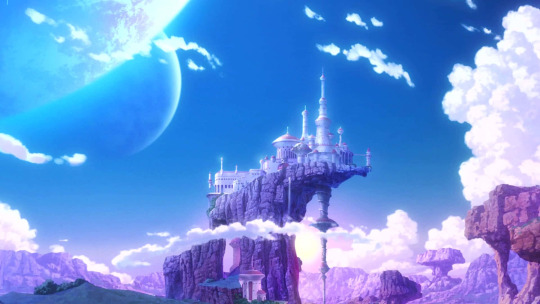
I. Government Structural Basics
My favorite... Genuinely. The Saiyans are my political analysis DREAM (just without all the math). Some lore -- the first DB content I was exposed to, in full, was the 2018 Broly movie. Not the best start in terms of canonical timelines and building content from the ground up - BUT - it happened. I was not expecting a shonen manga-anime series to have a movie that opens with such a heavy handed demonstration of a tyrannical despot and vassal state patronage. Maybe I am giving it too much credit but the dictatorial, patrilineal passing of power, so seamlessly avoiding any form of deliberation or consultation we see Cold direct and the disillusioned response of the Saiyans is so so so easy to connect to an empire-vassal dichotomy that I simply cannot help myself. A vassal state, a medieval perfected concept, is a state that is beholden to an empire or superior state's power. A great example would be the Ottoman Empire and the lower cradle of S.E. Europe, feel free to go look it up. The controlled Vegetasei/Planet Vegeta encompasses this definition but ALSO it's more enriched one: "a state with varying degrees of independence in its internal affairs but dominated by another state in its foreign affairs and potentially wholly subject to the dominating state". Vegetasei is a fully functioning monarchy (more on this later, too) that is beholden to the Freeza Force with it's time, resources, militaristic strength, personnel, citizenship, and sovereignty. It functions internally with a significant degree of independence, with external function that benefits solely the dominating state. I think its not really a stretch of the brain to see the empire-vassal patron relationship here. Though we do not know HOW Cold overtook the Saiyans, the assumption of force is reasonable, a common denominator in vassal states. Or, possibly, given the Saiyan values and the expectation of the FF, they were absorbed consensually that then delved into tyrannical patronage. I don't know. This is more of a sketch of my general assumptions and thoughts for this section and a spring board for the deeper explorations of Saiyan politics.
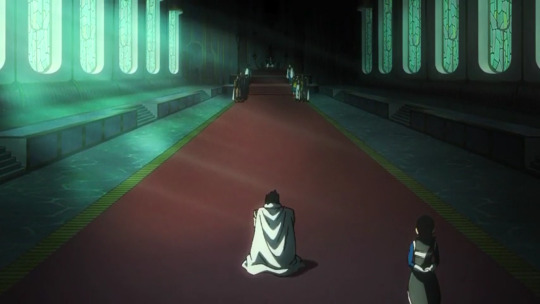
II. Vegetasei: The Oppressive Oppressed Vassal State
Now that we've established the relationship at the core of Saiyans and their lizardy occupant, I can get into the specifics. More of my favorite thing to do! I see much discussion of the treatment of Saiyans by the Cold Dynasty but not much on the condition of Vegetasei's internal workings and authoritative structure. Which is strange as I feel the political condition of the Saiyans is just as conducive to character arcs like Vegeta's or motivations like King Vegeta's as the subjugation conducted by the Force is. So, what is Vegetasei's political composition? What makes the Saiyans, especially their prince and king, behave the way they do? Bear with me. The Saiyans are a monarchical meritocracy with values of militarism and rigid, hierarchical social cohesion philosophy. That's a lot of words. Too bad I'm going to make you read (understand) them!
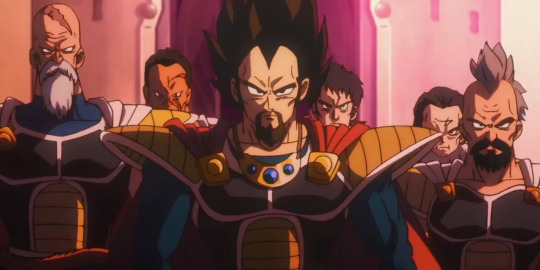
III. Monarchical
This one is self explanatory but I am a yapper so yap about it I must! Saiyans are a monarchy. Wow. Shocker. But I would like to propose that the Saiyans function as a faux-mixed absolutist monarchy with hereditary expectation but is prone to socially acceptable coup d'état. Let's get some more defining out of the way. A faux-mixed absolutist monarchy is my own proposed hybrid of a mixed and absolutist monarchical structure.
Mixed: a form of government that combines elements of democracy, aristocracy and monarchy ostensibly making impossible their respective degenerations which are conceived in Aristotle's Politics as anarchy, oligarchy and tyranny.
Absolute: a form of monarchy in which the monarch rules in their own right or power. In an absolute monarchy, the king or queen is by no means limited and has absolute power.
Okay. So. We can see throughout many flashbacks to Vegetasei in its heyday that King Vegeta was surrounded by what looks like a council or military posse, constantly. He has a consultative court that, really, has no authority and might just be there for political bluff and show/posturing. We see matters of science, military, and general royal court procedures be present in King Vegeta's assembly. Paragus is described as a "colonel", implying there is a military hierarchy that spills out beneath the king. There is also a blue-cloaked Saiyan who speaks openly to King Vegeta about denying Freeza's request for the prince. Additionally, there are instances of scientists talking openly about the prince's incapacity compared to Broly to the king's face and live. So, given these, it seems these positions are places of legitimate prestige but hold no sway in political construction. Thus, I'd argue there are political apparatuses and institutional bodies placed beneath the king, who will ultimate say over them. I've included what I think the Saiyan monarchy is structured like (it's pretty rudimentary but I am not going for 100% depth*):
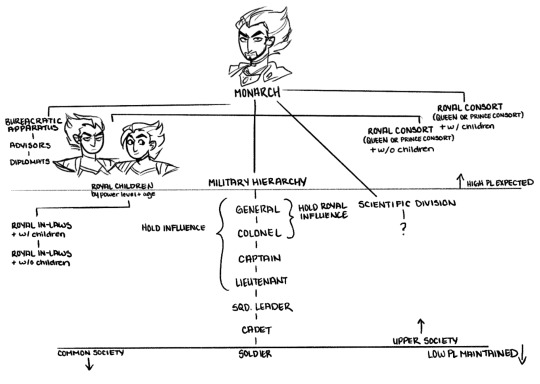
*You can see I denote that the presence of children makes or breaks minor positioning in the upper caste of the royal family/echelon of Saiyans. I think posterity is very important. Read more slightly below.
On top of being absolutist, I'd like to argue that the monarchy has "hereditary expectations [and susceptibility] to socially acceptable coup d'état". What do I mean by this? I believe it is pretty easy to assume that the Saiyan monarchy (given its corrupt maintenance) is held by the House of Vegeta/Court of Vegeta, depending on who you ask. I make the assumption on calling it the HOUSE OF VEGETA because of the familial name. Often, royal families are defined by the names inherited by its members (i.e. the Brits). With our prince of all Saiyans Vegeta being the fourth in his lineage, I think it is safe for me to assume this condition. From there, I work under the idea that the right of the king is passed down from parent -> child (assumedly father -> son if we look at what we have so far in canon. I would assume the same value is placed on females and that females can inherit the title of queen/whatever their female equivalent is from their father's or sole maternal parent. That's a whole other essay. Sexual dimorphism does not equal sexism but anyways). So, that covers the standard understanding of familial/hereditary expectations. Right? Sure. Hang tight. I think an important thing to note is that we never see or hear (as far as I know, please correct me if I am wrong) Vegeta call Trunks or Bulla by any term of royal value. Therefore, I'd like to make the argument that even if the royal tie is carried from generation to generation, there is only the expectation of royalty found in blood, not instant ordainment. This is where socially acceptable coups come in.
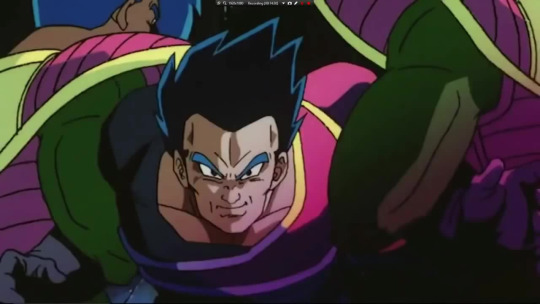
Vegeta says in the Broly 2018 movie (much to my dismay, this version is so much worse) that, upon the death of his father, "[he'll] never get to be King Vegeta" (paraphrasing). While this is a poorly written throw away line, pair it with how Vegeta never, ever refers to himself as king. Always prince. He will forever be the prince. Even Freeza observes this, albeit with malicious intent. I'd like to argue then that Vegeta, as the son of the king, is expected to fight for and win his position as king or to be purposefully given it by his father but because he can never be properly ordained/crowned as king, he is stuck as prince, dooming his lineage to never receive the rightful processes to accept their blood's expectation. This is how multiple families can compete for the throne. Should a blood-obligated child of the king fail to ascend (either by coup/force or by selection by their father), a rival family or individual can swoop in and compete for the inheritance of the throne. And how do they compete and validate their ascension to a throne that belonged to a different family? Merit. How does a son/daughter usurp, be granted, or claw their way to the throne? Merit. Which Segways perfectly into the next part of Saiyan structure!
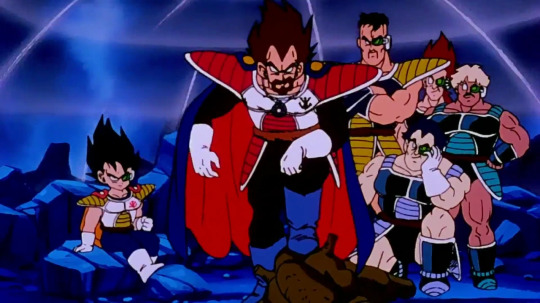
IV. Meritocracy
Much like it's empirical controller, Vegetasei is so merit based it almost hurts. A meritocracy asserts that a government is ruled/power is held by individuals "selected on the basis of their ability". Further, "advancement in such a system is based on performance, as measured through examination or demonstrated achievement". A meritocracy also asserts that the accumulation of wealth, power, and influence is concentrated in those who are higher valued by the society itself. This I think is pretty well explained by the privilege and value placed upon those with higher power levels. Their concept of merit (as per Vegeta's narration and understanding of Saiyan culture, excusing any inconsistencies or indoctrination for a moment) is constructed on a few things: pride, capability, born caliber, and execution of these elements. The concept of these merits runs so deep in Saiyan culture that it runs BOTH ways in terms of power capacity: too weak is seen as a weakness that must be exterminated or exiled while also too powerful is seen as a danger to the fabric of society (i.e. the arrangement of power). So, merit is a double edged sword to Saiyan society and this facet of danger is increased by the Force's regime. Merit manifests itself in very different ways (that I will get to in later sections) but the important foundation here is that due to being a meritocracy, there is NO trickle down political or societal gain from the monarchy. There is only a frantic scramble up. If you are too weak, you must scathe by if you have not already been disgraced. Too strong? Either hope it's beneficial to the society or that the Force or the crown does not consider you a threat. Either way, whether you're run of the mill or an outlier in power level, the merit of your Saiyan Traits is what gets you anywhere. What I find interesting is that there is evidence that implies societal climbing while also hinging on NO social movement due to power levels being seemingly fixed at birth (or at least very early in life). I find this interesting-- in the OG Broly movie, we see the explanation that baby's power levels are observed and in the 2018 Broly movie, its implied birth power levels dictate not just what you're going to do, but how valuable you are and if you're even worth keeping on the planet.
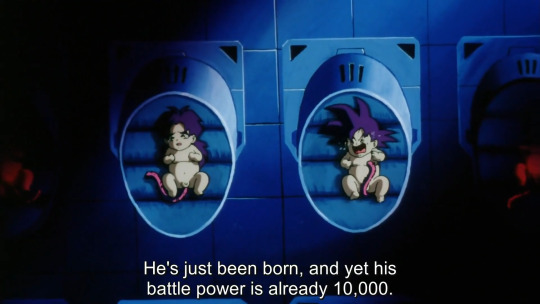
I think the best exploration of this can be in Tarble. Despite the dubiousness of his canonicity, I find it particularly insightful that even a prince was not given the chance to be cultivated into a power house but rather nigh instantly abandoned due to two perceived faults in the classifications of merit:
No born caliber (low or untapped PL)
No capability (implied gentle spirit)
I think it also goes to show that the higher up you go in the society, the more a low PL matters to the merit of who the child is associated with. We can get more into this in the social hierarchy part but compare Tarble's position and fate with, let's say, Gine. Very different-- but the common thing is that the traits of merit are not exhibited to societal standards, garnering a societal ruling of less value, paid in either exiling or low-level societal jobs.
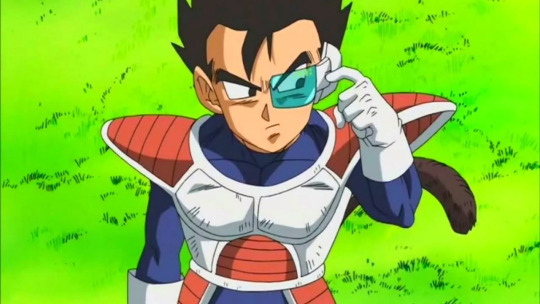
So, tangent aside, let's break this down in the last two categories of my aforementioned word soup of Saiyan political structure.
V. Militarism
Y'all could see this one coming. Militarism is classically defined as "the belief or the desire of a government or a people that a state should maintain a strong military capability and to use it aggressively to expand national interests and/or values." In political science (polsci), this extends into a school of thought called Realism, establishing the "security dilemma". While I do not think the full extent of this sketch of realism 100% applies to Saiyan political composition, I think it matters. Realism is defined by a few characteristics: the world is inherently anarchic, state actors are the main actors, and the security dilemma. The security dilemma asserts that a state must continue to bolster, improve, and better its militaristic prowess and power projection to defend itself and assert its own power as other states assumedly do/feel the same. Sound familiar? Security dilemma literally got the Saiyans slaughtered. Toriyama somehow managed to put the inklings of realism in an anime about a monkey boy who punches things. Anyways.
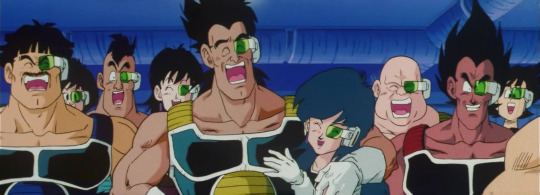
Saiyan societal structure is ALL ABOUT your place in the MILITARY, both in respects to the internal/domestic and to the foreign/Freeza employment. Let's focus on the domestic for a moment. The Saiyan Armed Forces is spearheaded by the House of Vegeta, maintained as a separate but maintained branch of the FF. The initial description of ranks were "Elites" and "low-class", showing merit assessed structure. It is a seemingly compulsory army, with some form of required service and with no retirement save for types of dishonorable discharges (example: Gine or...dying). The army is the backbone of Saiyan society, functioning on multiple levels of society and with a great menagerie of apparatuses for conducting operations. The army is dedicated to accumulation of resources, no matter the position. This is where the security dilemma assembles itself in the sketch of the army -- its entire purpose is to Saiyan bolstering (until it is commandeered by the CF/FF). The accumulation of planets, races, trade routes, resources (foodstuffs, raw goods, etc.) is the main goal of the army and the main identity-giver of any soldier. They also practice realism in that the army inherently treats ANY opposition as inherently anti-Saiyan (anarchic) and works on behalf of the state solely (state actors). I don't have too much to really say about the military given its pretty self explanatory nature. I think it's a perfect microcosm of the meritocracy and...omg...VASSAL STATE IS BACK!!!! GOSH THE ARMY IS A PERFECT EXAMPLE OF VASSAL/EMPIRE PATRONAGE.
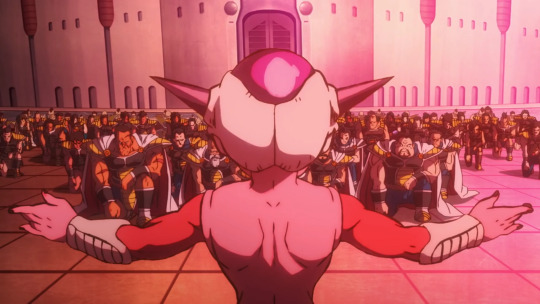
As defined earlier, the vassal is subjected to the empire with "foreign affairs". The Saiyan army is its biggest hand in the international galactic arena, a force to be reckoned with and a force that is KNOWN for its impartialness in imperial conquest. The commandeering of a nation's foreign muscle is the perfect move for a vassal-owning and -employing empire. The control of the army is the swiftest, most effective move to undermine the Saiyan monarchy, society, and cultural values as the military is, was, and continues to be the Saiyan's "everything". By absorbing the army, the Cold Army/Freeza Force effectively paralyzed the Saiyans, making them MORE than beholden to the empire in that by controlling their strongest apparatus of control, the average Saiyan can do nothing without the FF. Another interesting note (that is a small tangent)-- it's fascinating how the CA/FF manages surveillance given the vastness of space and the hostile/temperamental nature of the Saiyans and their warlike inclination: the Scouters. The establishment that the Scouters LISTEN is so so so smart for a despot empire to put into place! It's very 1984 and establishes some control on the... drum roll please...next section!
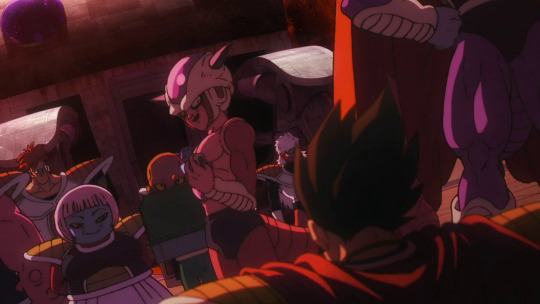
Everything in this point is a little more out of my amateur "expertise" as it deals more with sociological domestic policy than military/IR so, it'll probably make less sense.
VI. Rigid, hierarchical social cohesion philosophy
Saiyan social structure is given to us very clearly, by multiple sources, and it seems to be handled with quite the lot of animosity. Social cohesion is "the strength of relationships and the sense of solidarity among members of a community" and is often identifiable by a community's social capital. Social capital is the basic trust, foundation, and interactions within a society permitting it to function. Social cohesion is upheld by the following facets: a sense of belonging, social relations, and an orientation towards the common good. The question now becomes -- Grace, if you're trying to say Saiyans have social cohesion, how can that coexist with animosity and competitive merit? Great question. I would like to posit that Saiyan social cohesion relies on this push-pull of merit, competition, and the pride of a conditional brotherhood rather than the cut and dry, earthly expectations of social cohesion. Let's walk through these real quick! (I must avoid making this another 2k words long). Sense of belonging: Saiyan's are described by Paragus in Broly 2018 as generally untrustworthy. They are backstabbing, power-hungry, violent cages of people. Yet, Saiyan pride (and the merit of it, see the follow through?) is what ties them all together. The sense of belonging perhaps doesn't come from actual, well-cultivated cohesion but rather their species identity in BEING a Saiyan, not BEING IN COMMUNITY. I have a lot of thoughts about how Saiyans are more tribal beings than they'd admit but that's another essay that cannot be tacked onto this one. We much stay focused, brothers. Social relations: Relationships and familial ties do exist in Saiyan society, though they don't seem to manifest in an exact one-to-one way as per Earth standards. I, as per earlier, argued there is power in the blood line and I think that rings true throughout the general society. Looking at how Goku is more often referred to as "Bardock's son" over anything else or how Vegeta is a seemingly patrilineal name, I'm going to make the leap that paternal line determines a lot of social relationships. They are maintained by fatherhood, power levels (a low enough PL can result in the bloodline 'dying', cause of death: disgrace), and a militaristic aspect of brotherhood over blood in most occasions. Orientation towards the common good: Don't let "common good" distract you- a common good can be anything the society agrees is good. So, what do Saiyans conclude as good? Conquest, war/conflict, victory, kill counts, strength, power of the people, power of the Saiyan, power in general. This is once again where merit-competition and cohesion interact- yes, one would want to ascend ranks, to claim victories, to pursue power, but can one do that alone all the time? Possibly. Vegeta sure does think so, but he seems to only act on this value when Nappa becomes useless to him. Use is a common good, purpose is a common good. Your fellow brother, your fellow warrior, etc. has purpose when the two of you can bring forth Saiyan glory. It's a temporary arrangement but one nonetheless.
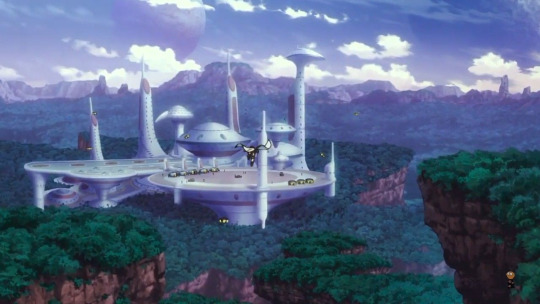
All of these things though are maintained by societal structure. It is the rigid social hierarchy that encourages social cohesion and the subversive method of turning animosity into brotherhood and vice versa given the need at the time. The distance of the monarch, a seemingly untouchable governor, seems to imply also that these societal structures are upheld by the populous but made 'perfected' by the monarchy. A monarchy that wants to maintain power will cause controlled discord within its own state so that any transmission of power seems either 1. Improbable/dangerous (highly likely due to FF occupation) 2. Not needed because the leader provides some type of stability. I could argue that the social cohesion of Saiyans relies on a strange form of Diversionary War Theory. Diversionary Way Theory states that "unpopular leaders generate foreign policy crises to both divert the public's attention away from the discontent with their rule and bolster their political fortunes through a rally around the flag effect." I believe this is more of a...Diversionary Social Theory. With the society so folded in on itself for merit and competition, the king can maintain power for his line alone by altering it, looking at different social conflicts (low PLs, Frieza Force encroachment, etc.) rather than surrender powers. Sounds corrupt. I know. That leads me to my final facet of Saiyan political structure.
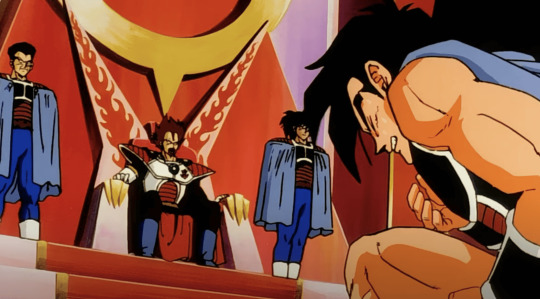
A little more back into my expertise, briefly.
VII. Corruption
I am sure you all knew I'd get to this to some extent. To say the Saiyans are void of corruption would be a fool's statement. I think there are two main forms of corruption seen in Saiyan society.
Despot maintenance of power
Society-induced and maintained methods of population/defection culling
Despot maintenance of power
A despot is an often tyrannical leader with a monopoly on power. Despotism is the "form of government in which a single entity rules with absolute power. Normally, that entity is an individual, the despot, but societies which limit respect and power to specific groups have also been called despotic." In writing this, I've realized that the Saiyans are equally despotic but geez I am too far into this to add ANOTHER section so a definition is all you will have to settle for. King Vegeta is a an active despot. I don't think this is a dramatic statement. He is shown to remove opposition, going to the lengths of infanticide and murder to do so. He antagonizes his specialists who dare question the legitimacy/efficacy of his lineage. He makes deadly errors in foreign policy by stationing snipers at Frieza at the risk (and expense) of their lives. He targets his own son and banishes him as an exile, completely intended to kill him in the long run. King Vegeta is losing 0-2 in trying to not kill babies/kids. I don't have much else on this subsection due to its pretty straightforward nature and political gain. In both Broly movies albeit for...weirdly different reasons...the King argues that the murder of Broly (and subsequently Paragus) is justified because it 1) ensures the social and political status quo, 2) muddles the waters on proving or accusing Vegeta's house in intending to not relinquish power even on correct merit values, and 3) shows how he, in general, is unwilling to admit defeat and hold onto power.
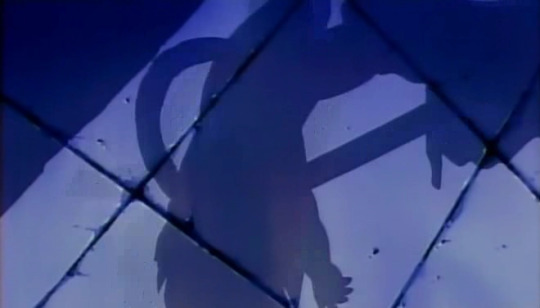
2. Society-induced and maintained methods of population/defection culling
This is touched on briefly in the aforementioned social cohesion section. Culling is the method of killing the population of a wild animal to preserve its maintainability. Saiyans practice this with different principles at its core; I believe it is simply an unsaid, dark reality for the majority of the media due to its reach and aimed audience. However, where we do see glimpses of infanticide with the goal to protect the purity of strength in Saiyan numbers. Goku's PL is a concern. Him being a runt or being behind on schedule seems to be an issue, even if minimally stated. Broly's PL is a threat. Tarble is a royal liability. All of these seem to be justifiable reasons to straight up KILL them (or at least exile them from the population with an understood mortality rate). Now, Raditz seems to be an exception but I'll argue that he serves as a necessary low-PL canon fodder for more powerful members society. That is a more social cohesion point that I could've included but my lanta guys this thing is long enough. The society itself seems to maintain this principle - whether you HC there being a governmental agency observing infants power levels as the OG Broly movie would imply (which is interesting in and of itself looking at it through a bureaucratic apparatus lens). Monarchy perfects, society maintains in striving for that perfection due to merit competition, value of the patrilineal line, and a cohesive idea of Saiyan pride on a general societal level.
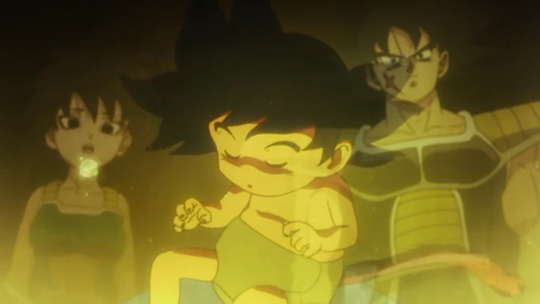
VIII. Conclusion
The Saiyans are a monarchical + despotic meritocracy with values of militarism and rigid, hierarchical social cohesion philosophy.
I hope now that we've reached the end, this contributes something of at least SOME merit to the discussions and long text-posts I've been seeing floating around DB tumblr recently. I think smashing my degree and Dragon Ball together might've killed all my braincells but at least I can exhibit to my professor that I understand a majority of what I've been putting thousands of dollars to to learn.
I am not responsible for any typos or misspelling; y'all figure it out.
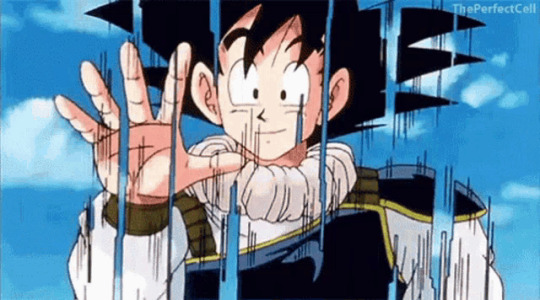
Takes the heaviest breath ever. I'm going to stop here-- it is finals season and I have a test over US foreign policy tomorrow. Yap session: OVER.
PLEASE INTERACT WITH THIS DB OVERTHINKERS PLEASE.
#db#dbz#dbs#dragon ball#dragon ball z#dragon ball super#dbgt#dragon ball gt#saiyans#planet vegeta#saiyan#saiyan culture#go zero notes go!!#I could go so much more into this but I SHANT for my own good#and for y'alls.#hope your ears aren't bleeding#son goku#goku#kakarot#prince vegeta#frieza#freeza#frieza force
71 notes
·
View notes
Text
Here's a thought that I've had for a while and have decided to randomly share, but remember the post I mentioned about ragged schools?
Well, a part of their education was also prayer and religious instruction. I've thought this for a while now, but Jude doesn't seem to be very comfy with religion, and I've also noticed that some settings take place in the church.
Kind of going into spoilers here, so I'll add a cut. There’s no point to this post, it’s just an observation.
For example, in the first wedding event, Jude calls the chapel cursed amongst other things. Perhaps because that's where marriage vows are made and he believes love is a curse, but it could be other reasons.
In his first BD story, Kate is found unconscious in a church. I thought that was an odd random setting, but let's just say it could be significant?
In his bond level 7, he uses the term "root of all evil," when referring to love, but is usually reserved for money. (Which we know Jude needs a lot of.) The fact that he is using a play on words in a scriptural sense doesn't surprise me because back then religion was everything. I listen to a historical podcast, where it discussed how even during job interviews you'd be asked what church you were affiliated with.
Moving on, in Ellis' route, Jude refused to enter a church. I'm sure his reasoning for not being interested in going inside was valid somewhat, but I don't think that was the whole reason. I could be wrong though.
Now, in the second wedding event, he does go to a church to be wed, but that is to make Kate's dream to come true. (Awwww). In any case, he has the pastor escorted out right out so he can sign a contract with his wife.
Finally, from what I could tell, out of all the IkeVil suitors I think Jude mentions going to hell the most. Not that the others don’t, but it’s something he says quite a bit. I wonder if it’ll be a part of his lore at all?
26 notes
·
View notes